#where are all the phenomenal desi singers ???
Explore tagged Tumblr posts
Text
lmao the rolling stone including jungkook on their list of top 200 singers of all time thats a fucking joke hahaha
#iu is on there rightfully so but#if youre going to bother to include kpop singers#it is then incumbent upon you to actually do your research and listen to idols that can actually sing and sing VERY fucking well#jungkook over any singular member of btob????#over any members of exo ?????#desperate attempt at relevancy#also if youre expanding outward to include skorean music (well just fucking barely) then why not branch out even further#where are all the phenomenal desi singers ???#middle eastern singers ???#african singers????#brenda fassie should earn a place on it by rights her voice is amazing#its just such a BROAD statement to be like 'these are the top 200 singers of ALL TIME' and then to barely scratch the surface#nina hagen ???????#n e way i just think its very hilarious that theyve included jk to appease the weirdo masses but in doing so have basically insulted#all the others lol#mads.txt
18 notes
·
View notes
Text
WILDCAT
December 17, 1960
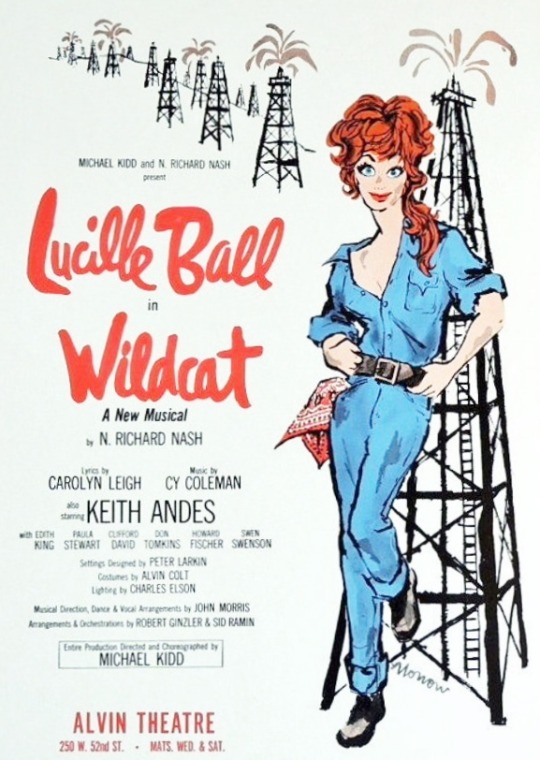
Wildcat is a musical comedy about Wildcat Jackson and her sister who come to oil country in 1912 to strike it rich. She runs into the prowess of Joe Dynamite, and a battle of the sexes and the oil tycoons ensues.
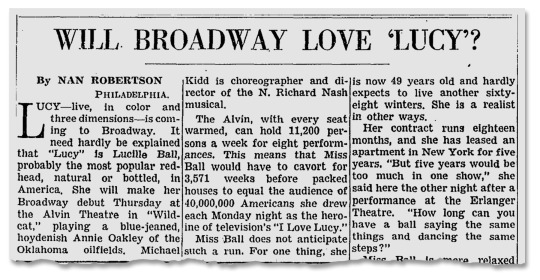
Wildcat wasn’t written with the 48 year-old queen of comedy in mind so when she showed interest, the script by N. Richard Nash had to be radically re-written.
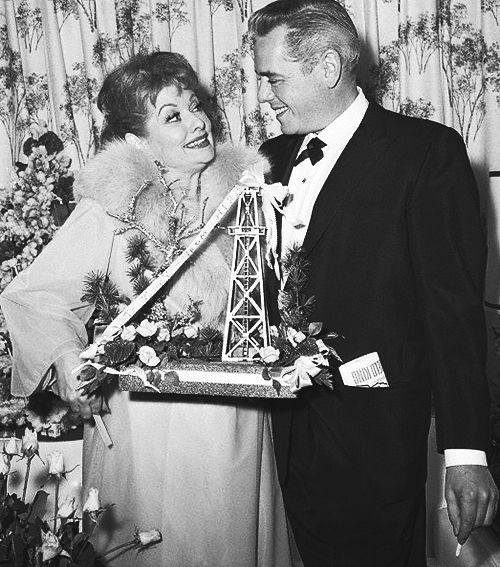
At the start of the 1960’s Ball’s career was taking a new direction. She was leaving her TV personae Lucy Ricardo (as well as her real-life husband Desi Arnaz) behind for newer horizons. It was their company Desilu that would produce Wildcat with Lucy having say over who would be cast as her co-star. After several of her first choices proved not available (including Clint Eastwood), she settled on Keith Andes.
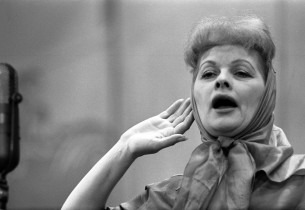
Although Ball was not known for her singing (a fact she traded on in “I Love Lucy”) or her dancing (which she was far better at), she had the determination of Wildcat Jackson to attempt it eight times a week.
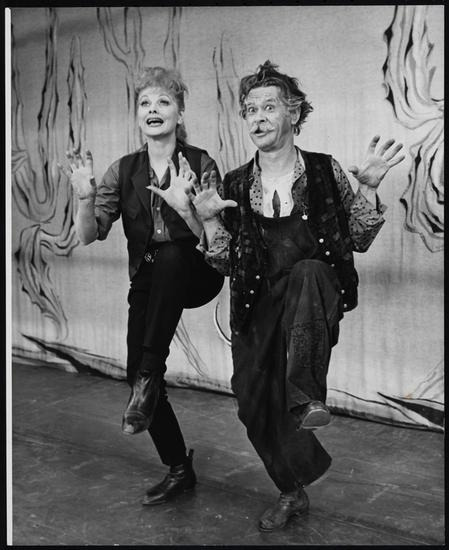
Director and choreographer Michael Kidd – known for his athletic dances – would put Ball through her paces. The score was by Cy Coleman with lyrics by Carolyn Leigh, giving Ball the rousing anthem “Hey, Look Me Over!” and the tuneful “What Takes My Fancy.”
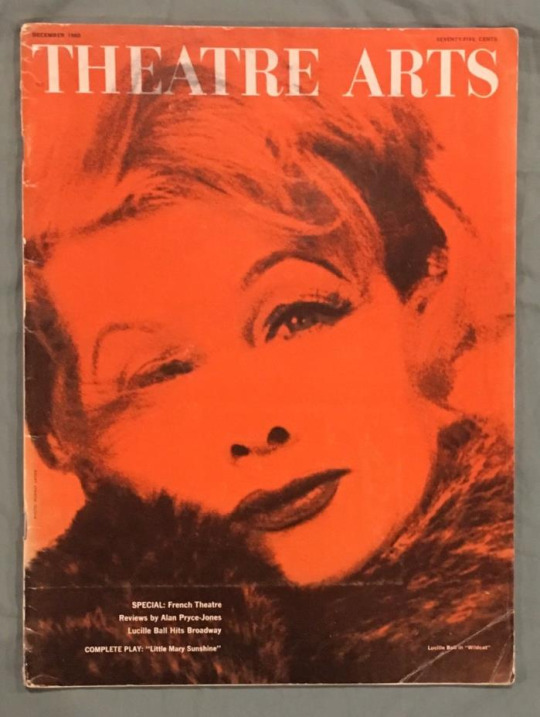
The out-of-town critics were mixed, but obviously adored the red-headed star. The show was headed up the New Jersey Turnpike in trucks headed for Broadway when a serious blizzard stranded the caravan, causing the opening night to be delayed.

With just two previews under their belt, the show opened at the Alvin Theatre (now the Neil Simon) on December 17, 1960. Box office sales were buoyed by audiences expecting to see Lucy Ricardo, not Lucille Ball as Wildy Jackson, so eventually Ball interpolated more and more of her trademark comic inflections into her character.
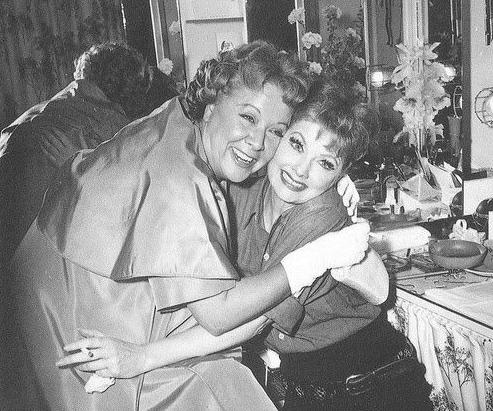
Then Ball took ill. She left the show for a bit with the idea to return and continue the run. But upon her return she collapsed on stage. Producers decided to close the show for as long as it took her to recover and resume when her strength and health had returned. But the musicians union insisted upon payment during the hiatus, which made the wait financially unfeasible.
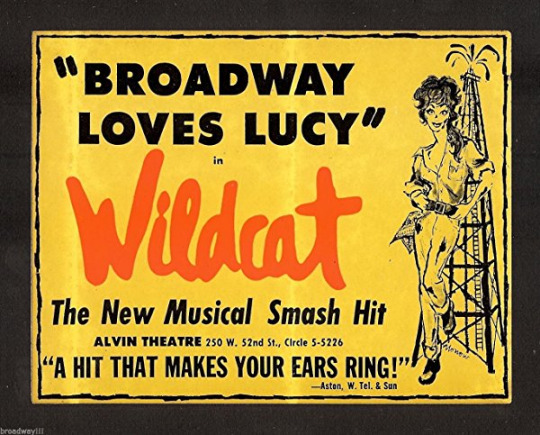
All in all, Wildcat lasted 171 performances. It wasn’t Ball’s only musical, however. In 1974 she took on the title role in the film of Mame with mixed to poor critical reactions.
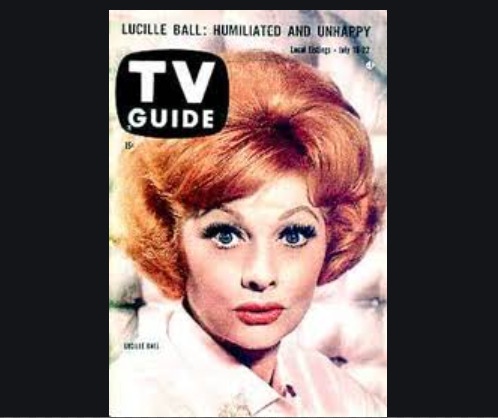
"Then I go to New York with the two children, my mother and two maids. We have a seven-room apartment on 69th Street at Lexington. I’ll start rehearsals right away for a Broadway show, 'Wildcat.’ It’s a comedy with music, not a musical comedy, but the music is important. I play a girl wildcatter in the Southwestern oil fields around the turn of the century. It was written by N. Richard Nash, who wrote 'The Rainmaker.’ He is co-producer with Michael Kidd, the director. We’re still looking for a leading man. I want an unknown. He has to be big, husky, around 40. He has to be able to throw me around, and I’m a pretty big girl. He has to be able to sing, at least a little. I have to sing, too. It’s pretty bad. When I practice, I hold my hands over my ears. We open out of town - I don’t know where - and come to New York in December.” ~ Lucille Ball, TV Guide, July 16, 1960
THE SCORE
Lyrics by Carolyn Leigh and Music by Cy Coleman

Act I
I Hear - Townspeople
Hey, Look Me Over - Wildy and Jane
Wildcat* - Wildy and Townspeople
You've Come Home - Joe
That's What I Want for Janie* - Wildy
What Takes My Fancy - Wildy and Sookie
You're a Liar - Wildy and Joe
One Day We Dance - Hank and Jane
Give a Little Whistle and I'll Be There - Wildy, Joe, The Crew
Tall Hope - Tattoo, Oney, Sadie, Matt and Crew
Act II
Tippy Tippy Toes - Wildy and Countess
El Sombrero
Corduroy Road
You've Come Home (Reprise) - Joe
(*) Songs cut sometime after opening night.
THE CAST
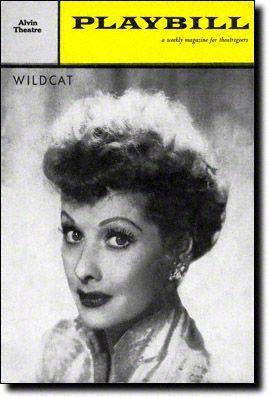
Lucille Ball (Wildcat Jackson) was born on August 6, 1911 in Jamestown, New York. She began her screen career in 1933 and was known in Hollywood as ‘Queen of the B’s’ due to her many appearances in ‘B’ movies. With Richard Denning, she starred in a radio program titled “My Favorite Husband” which eventually led to the creation of “I Love Lucy,” a television situation comedy in which she co-starred with her real-life husband, Latin bandleader Desi Arnaz. The program was phenomenally successful, allowing the couple to purchase what was once RKO Studios, re-naming it Desilu. When the show ended in 1960 (in an hour-long format known as “The Lucy-Desi Comedy Hour”) so did Lucy and Desi’s marriage. In 1962, hoping to keep Desilu financially solvent, Lucy returned to the sitcom format with “The Lucy Show,” which lasted six seasons. She followed that with a similar sitcom “Here’s Lucy” co-starring with her real-life children, Lucie and Desi Jr., as well as Gale Gordon, who had joined the cast of “The Lucy Show” during season two. Before her death in 1989, Lucy made one more attempt at a sitcom with “Life With Lucy,” also with Gordon, which was not a success and was canceled after just 13 episodes.
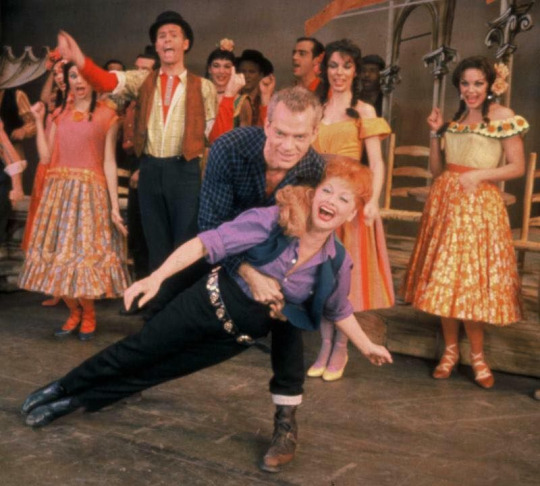
Keith Andes (Joe Dynamite) was born John Charles Andes in Ocean City, New Jersey, in 1920. Andes played Lucy Carmichael’s boyfriend Bill King on “The Lucy Show” in “Lucy Goes Duck Hunting” (TLS S2;E6) and “Lucy and the Winter Sports” (TLS S3;E3) and played Brad Collins in “Lucy and Joan” (S4;E4) co-starring Joan Blondell. Andes took his own life in 2005 after being diagnosed with terminal cancer.
Valerie Harper (Dancer, right) became one of television’s most recognizable stars as “Rhoda” (1974-78) a spin-off of “The Mary Tyler Moore Show.” She appeared in at “Kennedy Center Presents” honoring Lucy in 1986. She died in August 2019 after a long battle with brain cancer.
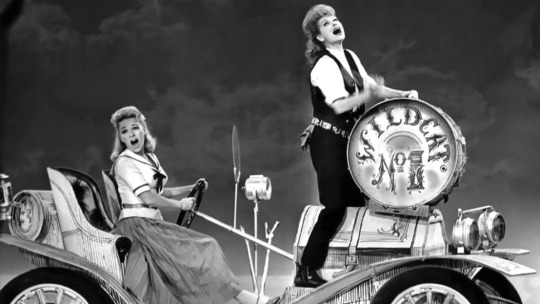
Paula Stewart (Janie) appears in the fourth of her six Broadway musicals between 1951 and 1965. Her only series television appearance opposite Lucille Ball was in “Lucy and Harry’s Tonsils” (HL S2;E5) in 1969. In 2017, she published a memoir titled Lucy Loved Me, about her friendship with Lucille Ball.
Hal Linden (Matt, replacement) became one of television’s most recognizable stars as “Barney Miller” (1974-82). He appeared at an “All-Star Party for Lucille Ball” in 1984 and at “Kennedy Center Presents” honoring Lucy in 1986.
Howard Fischer (Sheriff Sam Gore)
Ken Ayers (Barney)
Anthony Saverino (Luke)
Edith King (Countess Emily O'Brien)
Clifford David (Hank)
HF Green (Miguel)
Don Tomkins (Sookie)
Charles Braswell (Matt)
Bill Linton (Corky)
Swen Swenson (Oney)
Ray Mason (Sandy)
Bill Walker (Tattoo)
Al Lanti (Cisco)
Bill Richards (Postman)
Marsha Wagner (Inez)
Wendy Nickerson (Blonde)
Betty Jane Watson (Wildy Understudy)
Dancers: Barbara Beck, Robert Bakanic, Mel Davidson, Penny Ann Green, Lucia Lambert, Ronald Lee, Jacqueline Maria, Frank Pietrie, Adriane Rogers, John Sharpe, Gerald Tiejelo
Singers: Lee Green, Jan Leighton, Urylee Leonardos, Virginia Oswald, Jeanne Steele, Gene Varrone
MRS. MORTON
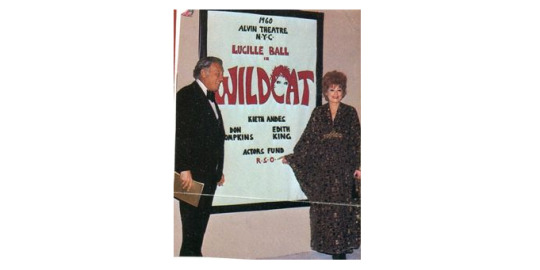
Lucy met Gary Morton while doing Wildcat on Broadway. She put off their first date due to her rigorous performance schedule. Eventually, he showed up with a pizza just when Lucy was craving one. They married on November 19, 1961.
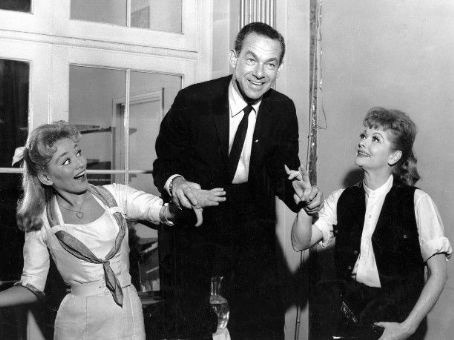
Comic Jack Carter served as best man at Lucy and Gary’s wedding in 1961. A few weeks later he married Paula Stewart, who played Lucy’s sister Janie in Wildcat. He acted in “Lucy Sues Mooney” (TLS S6;E12).
“HEY LOOK ME OVER!”
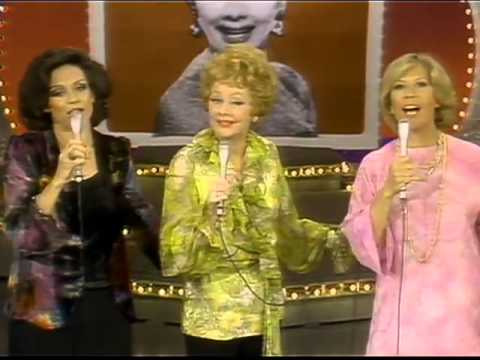
On June 4, 1976 Lucille is joined by Valerie Harper and Dinah Shore on “Dinah!” to sing her signature song from Wildcat, “Hey, Look Me Over.”
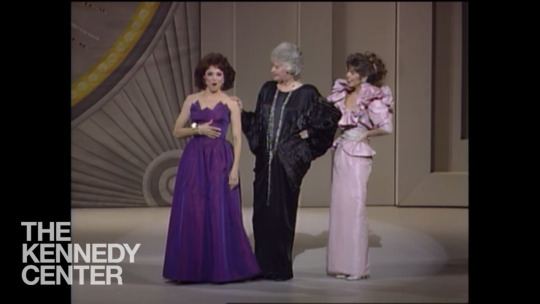
When Lucille Ball was celebrated at “The Kennedy Center Honors” in December 1986, Valerie Harper, Beatrice Arthur, and Pam Dawber sang a song parody of the “I Love Lucy” theme expressing their affection for Lucy. The medley ends with a specially-tailored “Hey Look Me Over”.
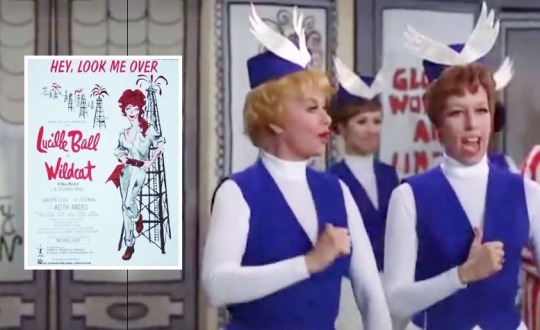
In “Lucy and Carol Burnett: Part 2″ (TLS S6;E15) on December 11, 1967, Lucy, Carol, and the ensemble perform “Hey, Look Me Over” with specially written lyrics to suit the episode’s theme of air travel.
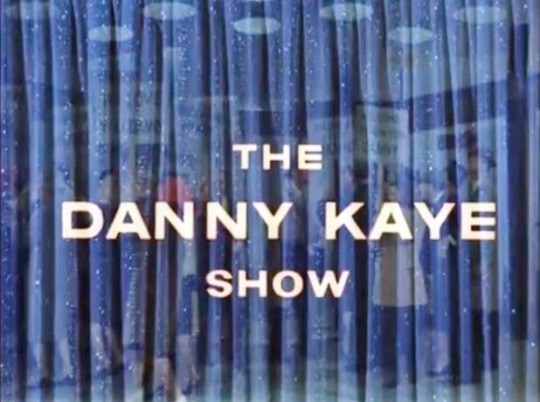
In “Lucy Meets Danny Kaye” (TLS S3;E15) on December 28, 1964, the opening of “The Danny Kaye Show” is underscored with the music to “Hey, Look Me Over.”
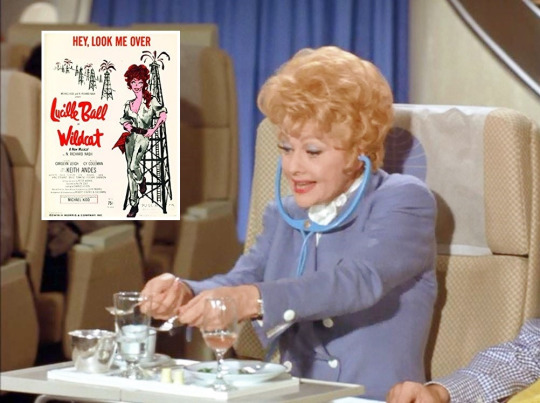
While David Frost is trying to sleep during a transatlantic flight, Lucy wears her headset and hums along to “Hey Look Me Over” while tapping it out on the glasses with her cutlery. The scene is from “Lucy Helps David Frost Go Night-Night” (HL S4;E12) aired on November 12, 1971.
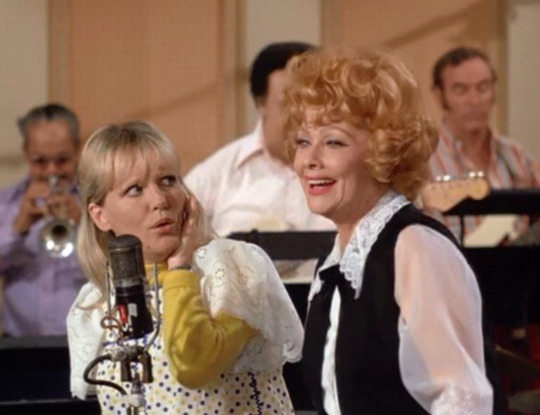
In “Lucy and Petula Clark” (HL S5;E8) in 1972, Lucy Carter leaves the office singing “Hey Look Me Over.”
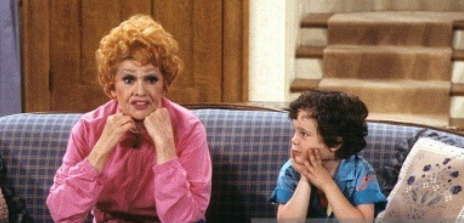
On “Life With Lucy,” Lucy’s grandson Kevin plays on the YMCA soccer team The Wildcats. The name of the team is probably a reference to Lucille Ball’s only Broadway show.
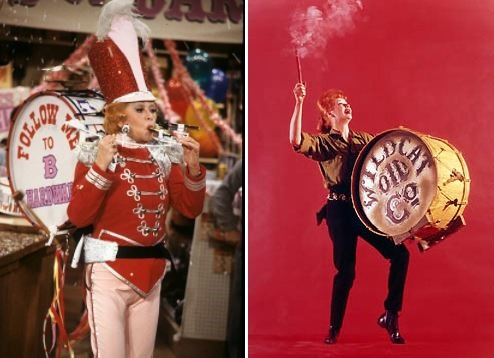
In the second scene of “Breaking Up Is Hard To Do” (1986), an un-aired episode of “Life With Lucy”, Lucy comes down the stairs of the living room singing “Hey Look Me Over.”
WILDCAT WILDCARDS
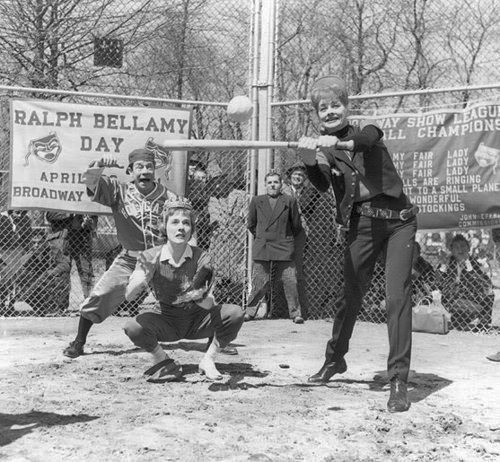
In April 1961, Lucille Ball played softball in Central Park for the Broadway Show League when she was appearing in Wildcat. Julie Andrews (starring in Camelot) was the catcher! The catcher was Joe E. Brown.
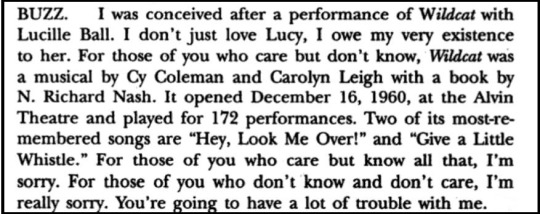
In the play Love! Valour! Compassion! Buzz, a gay musical theater aficionado (Nathan Lane on Broadway) breaks the fourth wall (a common conceit of the play) to tell the audience something personal about himself.
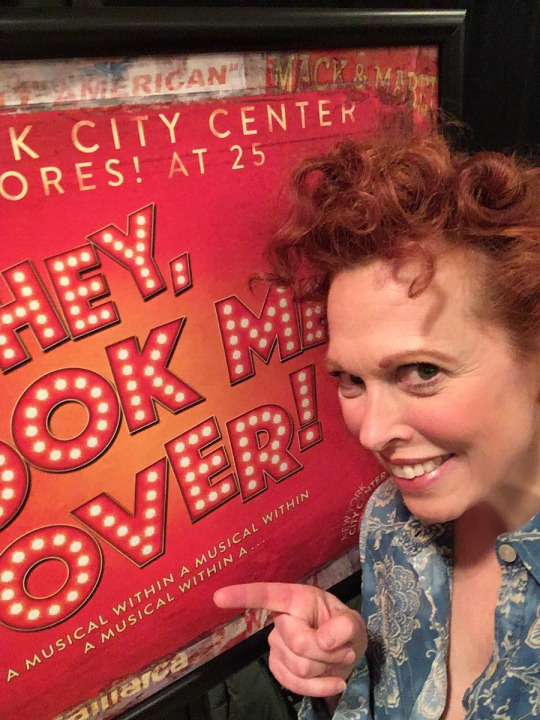
The song title was also the title of a 2018 revue about rarely produced musicals at City Center in New York City. Performer Carolee Carmello called it her “hair homage to Lucille Ball.”
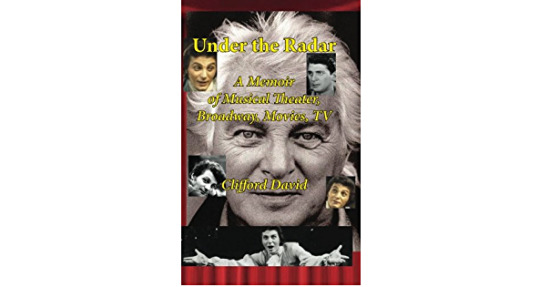
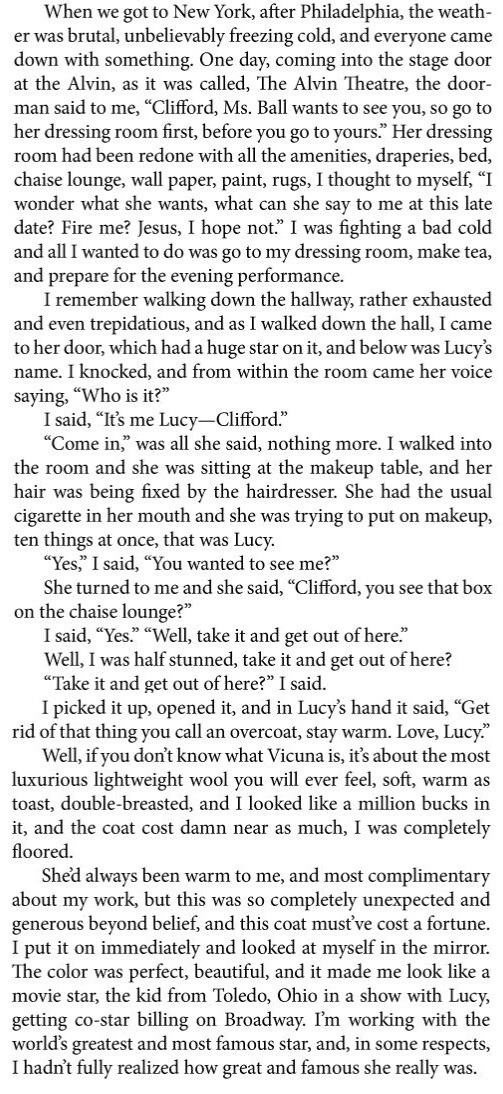
~ From the memoir Under the Radar by Clifford David, who played Hal in Wildcat
#Wildcat#Lucille Ball#Lucy#Broadway#Musical#Keith Andes#Gary Morton#Paula Stewart#Valerie Harper#Clifford David#Cy Coleman#Hey Look Me Over#Alvin Theatre#Hal Linden#Richard Nash#Life With Lucy#Here's Lucy#The Lucy Show#TV
4 notes
·
View notes
Text
This is NOT a good movie. But it is an amusing movie! It wasn’t like the “wait for death” viewing experience of Azhar, or the “I am so angry I can’t function” experience of Ki & Ka. It was a fun watch and if I had been about 20 years younger, I may have loved it.
This is just such a teeny-bopper kind of movie! It’s like Justin Bieber and Zayn Malik and Lesley Gore and Titanic and Twilight and Romeo + Juliet all got mixed together in a big blender, and then boiled down to their hormonal and immature essence, and mashed into some kind of Indian curry.
And hey, there’s nothing wrong with that! I own all the Twilight books and saw all the movies in theaters, I love Lesley Gore and The Shirelles and all of those people, and I was more than capable of swooning over an immature and dramatic love story when I was 13. But see, I’m not 13 any more. And so I watch this and think “I can see how this scene COULD work for me, but it just doesn’t.”
(Also, I now want to shake this girl and tell her to go home and do homework and write her college essay instead of waiting for some pimply boy to make her a promise he can’t possibly understand or keep)
Although it did explain why Aditya Roy Kapoor kept getting hoots at the Dear Zindagi screenings I was at! At least, the two of them where the theater was 50% young woman. If you are watching Dear Zindagi, I assume you can relate to the main character and her struggles as a young professional desi woman. And if you are a young professional desi woman, I assume you saw Aashiqui 2 when it first came out, when you would have been maybe between 17 and 21.
Which could have been the right age (depending on your personal development) for the whole thing to just about give you a heart attack from the ROMANCE and TRUE LOVE and EMOTIONS THAT PARENTS JUST DON’T UNDERSTAND! And therefore, Aditya Roy Kapoor will always have a special place in your heart. Just like all those woman who will always love Leonardo DiCaprio in a particular way, no matter how many big fancy films he makes (for me, it’s Zac Efron and High School Musical. Oh Zac! Why did you cut your floppy hair?).
(Oh Zac! I have this on DVD, with the special Karaoke version extra)
Anyway, that explains the hoots and cheers when he showed up in Dear Zindagi. Because there was that sudden moment when all these mature professional possibly married with children women were suddenly thrown back to late nights sobbing with friends over the beauty and passion of this love story, and why can’t a perfectly sensitive and damaged alcoholic wander into their life?
I was lucky enough to be able to watch this movie in a situation kind of like that. Well, I should say “wise” enough. Over Christmas, my sister was in town, and she came over to my apartment for a movie and pancakes one morning while the rest of the family was still asleep. I was thinking I would show her Patiala House or OK Kanmani or something, you know, “good”. And then I thought “No! This is the perfect time to finally watch Aashiqui 2! In my PJs, eating pancakes on a Sunday morning, with my sister.”
And it was perfect! We swooned over the moments when he looked at her and you just KNEW he was in love. And we cheered when the poor star-crossed couple was reunited. And we booed when the boring older people told them they shouldn’t be together, because they were too old to remember what Real True Love is like! And then we went “wait, there’s AN HOUR LEFT?!?!” Because unfortunately our patience for long-drawn out overly dramatic love stories featuring immature pretty people has gotten shorter over the years (you should have been there ten years ago, when we spent an entire Christmas break re-watching High School Musical and Hairspray. Oh Zac! I wish I still loved you that way).
(Okay, I still love him a little)
This is just the most delicious confection of stupid. It’s like eating a donut wrapped around bacon with whipped cream topping. Tastes sooooooooooooooo good, but there’s no actual content to it. And in the same way a donut tastes kind of like bread but without the nutrition, so does Aashiqui 2 taste kind of like A Star is Born but without the talent. Or Abhimaan. Ooo! I can do an info-graphic!!!
#gallery-0-7 { margin: auto; } #gallery-0-7 .gallery-item { float: left; margin-top: 10px; text-align: center; width: 33%; } #gallery-0-7 img { border: 2px solid #cfcfcf; } #gallery-0-7 .gallery-caption { margin-left: 0; } /* see gallery_shortcode() in wp-includes/media.php */
#gallery-0-8 { margin: auto; } #gallery-0-8 .gallery-item { float: left; margin-top: 10px; text-align: center; width: 33%; } #gallery-0-8 img { border: 2px solid #cfcfcf; } #gallery-0-8 .gallery-caption { margin-left: 0; } /* see gallery_shortcode() in wp-includes/media.php */
The lack of talent is the biggest problem with this film, moviemavengal and I were just talking about that. But in order to get into exactly what I mean by that, I have to get into SPOILERS SPOILERS SPOILERS SPOILERS SPOILERS SPOILERS SPOILERS SPOILERS
I had to watch the Judy Garland A Star is Born for a film class. Well, “had to”. It wasn’t like it broke my heart to do it, I love classic 50s musicals and Judy Garland and all of that. The only reason I hadn’t watched it before was that I had heard the ending was sad, and I hate sad endings!
I believe this version actually follows that one pretty closely. There is an initial meeting, he promises her the moon, then there is an accident and he is unable to follow through on his promise at first, and she waits for him as her life gets progressively worse. He finally, joyfully, finds her again. And then convinces his producers to listen to her, they immediately give her a chance, and with his loving support her career takes off. And he finally admits his love and they decide to get married. She quickly becomes super successful, while he is happy for her, but has an increasingly hard time filling his days and feeling useful. He turns more and more to drink, which has been a problem for him from the start. Finally, she announces that she is giving up everything in order to help him get better and stop drinking. He realizes that this means she will be depriving the world of her talent, and walks into the ocean and dies. She retreats to solitude and misery at first, but is then convinced by an old friend that nourishing her talent is the best thing Aditya/James Mason ever did, and it is better to honor him by continuing her career.
Now, there are two big changes the Bhatts made when they teeny-boppered this plot. I’m not even going to say “Indianized”, which is what they usually do. Because A Star is Born was already pretty Indian, big dramatic emotions, big song numbers, etc. etc. But the Judy Garland A Star is Born (not necessarily the original Janet Gaynor version) is also a very adult film.
That’s part of what makes it such a classic, Hollywood is so afraid of emotions and melodrama, here is a rare high budget high quality film that is about human drama, and doesn’t shy away from the tragedy and the ecstasy of it. And it does it in an adult way. This isn’t A Summer Place or Rebel Without a Cause. These are big emotions in a big way between two adults.
(This was another movie my sister and I watched together. Except, even as teenagers, it was too teenager for us to enjoy. She gave up halfway through, I stuck it out to the bitter end because I can’t leave a film half-finished. But believe me, the theme song is the best part)
Judy had been around by this point. She was a good 20 years into her movie stardom, and a lifetime into her career. And James Mason was similar, although less famous and familiar to the audience. And that’s what they are playing in the film. She isn’t some timid young newcomer. She is a band singer and a chorus girl and a Hollywood hanger on whose done everything and seen everything. And it’s just made her better than an newcomer could ever be. In Aashiqui 2, Shraddha has to be “polished” and “trained” before she can become a star. In A Star is Born, Judy has already been trained and polished, she just needs someone to see her.
And James Mason isn’t some lost little boy. He is a grown man, more than grown, who has lived a life of indulgence and experience and had thought he would never feel that spark of excitement again, until he met Judy.
And what really makes the difference, is how amazing phenomenally impossible to ignore Judy’s talent is. In any performance at any time, but especially in this movie! We don’t need the script to tell us that she is something special, that James Mason is in awe of her talent. We can see that for ourselves!
The age of the characters makes the performing ability more believable and remarkable, but it makes the love story something special too. It’s not about two kids swept up in the glow of first love. It’s about to adults, who have had many love stories before this, finding that “little kid” feeling again and slowly giving in to it.
So, that’s why it’s special. The one sentence description of the plot, “Guy helps girl become star while his star fades, then kills himself” doesn’t even come close to it. And it is just that one sentence version that this film is able to grasp. Aditya and Shraddha don’t feel like real complicated people grasping for happiness, their problems don’t seem grounded and tragic, and most of all, their “talent” doesn’t seem all that unusual.
I like Shreya Goshal’s voice, she’s fine, has a definite “Lata” sound, which makes sense she is Lataji’s niece (I think? Or cousin or something). But it’s not dropdead remarkable, like Judy’s voice was.
You know who does kind of have that voice? Aditya! Or rather, Arjit Singh. It’s rougher and deeper than the usual voice, and so powerful. And you don’t need me to tell you that, out of everyone involved in Aashiqui 2, Arjit Singh was the clear break out star of the film, the one who’s career was pretty much made from then on.
When moviemavengal and I were talking about the film, we bounced around the idea of a gender-reversed plot. What if it had been Aditya/Arjit who had the amazing world-changing talent and Shraddha/Shreya who was just kind of okay? I’d have loved to see Shraddha stumbling around drunk and getting into fights and having all of that kind of juicy stuff, while Aditya had to suffer in silence and sacrifice! And it would have made a lot more sense of things, for everyone in the film to acknowledge that Aditya was the once in a lifetime talent. (wait, that’s Khoya Khoya Chand, isn’t it? And also, Mahesh Bhatt’s real life!)
(Too bad Shiny Ahuja’s in this so I will never ever be able to watch it)
That’s the thing with the A Star is Born story, it only works if the argument that “the best thing he ever did was help you become a star” is actually true. For James Mason and Judy Garland, it certainly was. James had some decent screen presence and was fairly handsome. But you could tell that his character, just like himself in real life, was nothing special when compared to the huge bundle of talent that was Judy Garland. Same goes for Kris Kristofferson and Barbra Streisand in Star. And maybe Janet Gaynor and Fredric March in the original? I don’t know, I haven’t seen it, and Janet Gaynor is pretty great, but so is Fredric March. And also, hopefully, for Lady Gaga and Bradley Cooper in the new one.
Of course, it also only works if the film isn’t UNUTTERABLY STUPID. Starting with the tagline, “Love Makes Life Live”. What does that even mean?????? It’s right up there with “Love means never having to say you’re sorry”.
And then, right at the start they tell you their expectation for the audience when they refer to Goa as a “small venue” and warn our hero not to travel the streets alone because it’s not safe here. You know, those rough streets of small town Goa. This is the level of realism and common sense present through out the film. Our heroine goes vegetable shopping in the middle of the night. Our hero disguises himself by putting on sunglasses and a hat. And not only does he wear a stupid disguise, his disguise works! Because all the other people in this world are too stupid to see through it.
It’s a stupid world, and also a cheap world. Cheap cheap cheap cheap cheap. My favorite is when there is supposed to be a big confrontation in front of a crowd at a fancy party. And it is clearly just some random extras wearing whatever they had in their closet (no costume budget) standing in the lobby of an office building with a few tables scattered around. But, you know, white extras! So you can tell the party is fancy!
Oh! And there’s also all the big concert scenes, that are carefully framed so you can only see the stage, not the crowd, because there’s no budget for crowd scenes. Or the luxury apartment that frankly doesn’t look that luxurious. Or the fancy bar that is conveniently closed, so they don’t need to spend a lot on decorations or fancy looking extras (only so much money in the budget for white people!).
So, why doesn’t this bother me? Why don’t I find this movie infuriating, the way I do Azhar? Well, because it feels like they all KNOW they are making a stupid cheap movie!
Aditya and Shraddha are working hard and doing their best, but they aren’t exactly trying to put in the most sensitive and subtle performances of their careers here.
(Hopefully they are saving that for OK Jaanu. Full soundtrack now available on Saavn, by the way!)
Mohit Suri is a skilled director, he knows how to frame a shot and convey a story, but he isn’t bothering to do much more than that. The script is pretty reliant on a few punchlines and the rest of the dialogue is filler. The plotting, of course, is basically lifted straight from the Hollywood version, nothing terribly wrong there. Well, except that in the Hollywood version it felt like everything unfolded naturally based on the character flaws and strengths. Whereas here it feels like it unfolded unnaturally based on the need to fill 2+ hours of screen time.
These are a bunch of fairly talented people capable of putting together a much better film than this, but they chose to make a movie for the “kids”, as it were. One of the things I found really interesting when I did my little research on this film is how it was released. It had a very very specific audience in mind. No overseas release, limited urban release in India. And, my sister who is better than I with languages pointed out, lots and lots of Marathi touches.
This is a movie for the sappy young people of urban India, especially around Bombay. It doesn’t care about any one else because it’s not here for you. Like it, hate it, who cares, the Bhatts will still make money and the audience will still be happy.
The biggest thing that made it feel “young” to me is the attitude towards marriage. Why AREN’T they married???? They are living together, they are committed, but no marriage? It really feels like that is just because marriage isn’t “romantic” enough for the swoony teenage audience, it’s something their grown up parents and aunties and uncles do.
This also means they miss out the famous final line from both the Janet Gaynor and the Judy Garland version, “This is Mrs. Norman Maine.” Taking her husband’s identity forever as part of hers, giving him the fame that he helped her achieve. Instead we get some sappy “our love will go on” scene on a beach.
There’s another big change earlier, right before the suicide, in the original version Judy/Janet has sworn to give up her career to devote herself to taking care of her husband, and he overhears her and decides to kill herself to free him. Okay, I guess two big changes. In the original, since this is a grown up old guy, it feels like he knows he is never going to get better, change is not possible, this is a slow inevitable slide to death as she wastes her life. In this one, Aditya is young! Really really young! How does he know he can never possibly get better? The suicide feels random and impulsive, instead of regretful and considered.
Oh, but the bigger change is why Shraddha is going to give up her career. I guess staying home and keeping him company and trying to stop his drinking and take care of him is too “grown-up” and unromantic. So instead they go the passionate self-destructive route, and she announces that she is going to join him in his drinking! Just like Meena Kumari in Sahib Biwi Aur Ghulam! If he is living a life of intoxication, so will she, and perhaps she can find some form of joy in this. By the way, if there is any young woman dating an alcoholic, THIS IS NOT A GOOD IDEA. DON’T DO THIS! Be unromantic and sign him into rehab instead.
The only thing that made it break out of that audience group is, firstly, the soundtrack. And secondly, the brilliance of Mahesh Bhatt.
I love the soundtrack, I’ve been listening to Arjit Singh’s “Tum Hi Ho” since it first came out. Heck, that song was so good, even Shahrukh sang it!
I don’t know if they decided to throw all their energy and money into a really good soundtrack, or if it was just a coincidence, but either way, these songs are so much better than the movie and helped bring it to worldwide notice.
Secondly, Mahesh Bhatt! He put together Aashiqui 1 back in 1990, similarly sappy and silly and specific, and with two unknowns in the lead. But he gave it the heart, the love story of himself and his first wife back when they were so young and so innocent that their love felt like the most amazing thing that had ever in the world. And that is the spirit and ethos that carries through to Aashiqui 2. Even if his only involvement was supporting his nephew the director, and lending his voice as Aditya’s “father” in phone calls.
(The coat thing, that’s so swoony I’m gonna DIE. And of course, it is the element that came most directly from Bhatt sahib’s original)
(I’m not counting the focus on alcohol as part of his involvement, because Mahesh’s version of alcoholism onscreen is way way more realistic than this! Check out Daddy sometime if you want to see a real story of alcohol and art and love)
#Aashiqui2 : watch #AStarIsBorn instead for #JudyGarland or #Abhimaan for #JayaBachchan This is NOT a good movie. But it is an amusing movie! It wasn't like the "wait for death" viewing experience of…
#A Star is Born#Abhimaan#Aditya Roy Kapoor#Arjit Singh#James Mason#Judy Garland#Mahesh Bhatt#Shraddha Kapoor#Tum Hi Ho
0 notes
Text
SORROWFUL JONES
JULY 4, 1949
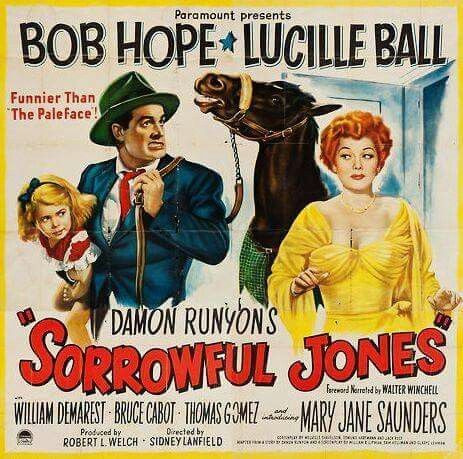
Sorrowful Jones is a remake of the 1934 Shirley Temple film, Little Miss Marker. In the film, a young girl is left with the notoriously cheap Sorrowful Jones (Bob Hope) as a marker for a bet. When her father does not return, he learns that taking care of a child interferes with his free-wheeling lifestyle. Lucille Ball plays a nightclub singer who is dating Sorrowful's boss.
Although the official opening night in Hollywood took place on Independence Day 1949, it was premiered in New York City a month earlier, and seen in Australia on June 24, 1949.
Directed by Sidney Lanfield Produced by Robert L. Welch Written by Edmund Hartmann and Melville Shavelson based on a story by Damon Runyon
CREDITED CAST

Lucille Ball (Gladys) was born on August 6, 1911 in Jamestown, New York. She began her screen career in 1933 and was known in Hollywood as ‘Queen of the B’s’ due to her many appearances in ‘B’ movies. With Richard Denning, she starred in a radio program titled “My Favorite Husband” which eventually led to the creation of “I Love Lucy,” a television situation comedy in which she co-starred with her real-life husband, Latin bandleader Desi Arnaz. The program was phenomenally successful, allowing the couple to purchase what was once RKO Studios, re-naming it Desilu. When the show ended in 1960 (in an hour-long format known as “The Lucy-Desi Comedy Hour”) so did Lucy and Desi’s marriage. In 1962, hoping to keep Desilu financially solvent, Lucy returned to the sitcom format with “The Lucy Show,” which lasted six seasons. She followed that with a similar sitcom “Here’s Lucy” co-starring with her real-life children, Lucie and Desi Jr., as well as Gale Gordon, who had joined the cast of “The Lucy Show” during season two. Before her death in April 1989, Lucy made one more attempt at a sitcom with “Life With Lucy,” also with Gordon, which was not a success and was canceled after just 13 episodes. She died on April 26, 1989 at the age of 77.
Ball's singing voice is provided by Annette Warren, who also sang for her in Fancy Pants and later provided the singing voice for Ava Gardner in Show Boat. Her first screen dubbing was for Lured featuring Lucille Ball, although Warren did not dub Lucy’s voice. She provided the singing voice for Pepper (Iris Adrian) in the Bob Hope film The Paleface (1947).
Bob Hope (Sorrowful Jones) was born Lesley Townes Hope in England in 1903. During his extensive career in virtually all forms of media he received five honorary Academy Awards. In 1945, Desi Arnaz was the orchestra leader on Bob Hope’s radio show. Ball and Hope did three other films together. He appeared as himself on the season 6 opener of “I Love Lucy.” He did a brief cameo in a 1964 episode of “The Lucy Show.” He died in 2003 at age 100.
Mary Jane Saunders (Martha Jane) makes her film debut. She went on to do a season of TV’s “Tales of the Welles Fargo” (1960-61) and made two appearances on “My Three Sons”: one with William Frawley and one with William Demarest.
William Demarest (Regret) is best remembered as Uncle Charlie on “My Three Sons,” a role created after the death of William Frawley. Demarest and Frawley appeared together on screen in The Farmer’s Daughter (1940). He was nominated for an Academy Award in the biography, The Jolson Story (1946). Demarest did two other films with Lucille Ball: Fugitive Lady (1934) and Don’t Tell The Wife (1937). He died in 1983 at age 91.
Bruce Cabot (Big Steve) appeared with Lucille Ball in 1934′s Men of the Night. In 1950, he joined Hope and Ball once again in Fancy Pants. His main claim to fame is rescuing Fay Wray from King Kong (1933).
Tom Pedi (Once Over Sam) did one season of the short-lived sitcom “Arnie” (1970-71). He was in the 1980 remake of Little Miss Marker, upon which Sorrowful Jones is based.
Paul Lees (Orville Smith) was blinded by enemy artillery during his service in World War II. He received 32 military decorations and ribbons, including the Legion of Merit. Despite his lack of vision, Lees learned to act and signed a contract with Paramount. He would memorize script dialog by having someone read it to him twice.
Houseley Stevenson (Doc Chesley) was a British-born character actor who had just finished doing The Paleface with Bob Hope.
Ben Weldon (Big Steve’s Bodyguard) appeared on “I Love Lucy” as the thief who breaks in to the Ricardo apartment to steal “The Fur Coat” (ILL S1;E9). He was seen in a season one episode of “The Lucy Show.”
Emmett Vogan (Psychiatrist) did four movies with Lucille Ball previous to this one. In 1954 he played Mr. Bolton in The Long, Long Trailer.
Thomas Gomez (Reardon) was an Oscar nominee for Ride the Pink Horse the previous year. In 1953 he was seen as Pasquale #2 on CBS’s “Life With Luigi”. He did a 1964 episode of “My Three Sons” with William Demarest.
UNCREDITED CAST (with connections to Lucille Ball)
Ethel Bryant (Nurse) was also seen with Lucille Ball in Broadway Bill (1934), another film involving a racehorse. John Butler (Jack - Bettor on Green Diamond) was also seen with Lucille Ball in The Affairs of Annabel (1938).
Bill Cartledge (First Jockey) was also seen with Lucille Ball in The Joy of Living (1938).
Maurice Cass (Psychiatrist) was also seen with Lucille Ball (and John Butler) in The Affairs of Annabel (1938).
Michael Cirillo (Horse Player) joined Bob Hope in Paleface and Son of Paleface as well as Critic’s Choice with Hope and Ball in 1963.
Charles Cooley (Shorty) was seen with Hope and Ball in Fancy Pants (1950) as well as a dozen other Bob Hope films. He also was a regular on “The Bob Hope Show” on television.
James Dearing (Spectator) was in eight other Lucille Ball films between 1936 and 1954.
Jay Eaton (Horse Player) was in eight other Lucille Ball films between 1937 and 1946.
Chuck Hamilton (Police Officer) was seen in the background of eight other Lucille Ball films from 1937 to 1950.
Selmer Jackson (Doctor) was in six other Lucille Ball films between 1933 and 1949.
Kenner G. Kemp (Bookmaker) was in seven other Lucille Ball films between 1936 and 1960 as well as doing background work on a 1965 episode of “The Lucy Show.”
Bob Kortman (Horse Player) was in four other Lucille Ball films between 1934 and 1950.
George Magrill (Horse Player) makes the last of his nine film appearances with Lucille Ball. He started in 1933 with Broadway Thru A Keyhole.
John Mallon (Horse Player) was also seen with Hope and Ball in Fancy Pants (1950).
John ‘Skins’ Miller (Jockey) was also seen with Hope and Ball in Fancy Pants (1950) and previously with Ball in The Big Street (1942).
Frank Mills (Horse Player) makes the last of his ten film appearances with Lucille Ball. He started in 1933 with The Bowery.
Ralph Montgomery (Horse Player) was one of the policeman on the scene in “Lucy Goes To The Hospital” (ILL S2;E16) in 1953.
Ralph Peters (Taxi Driver) was also seen with Lucille Ball in The Big Street (1942).
Suzanne Ridgeway (Nightclub Patron) was also seen with Lucille Ball in That’s Right - You’re Wrong (1939) and The Magic Carpet (1951).
Arthur Space (Plainclothes Policeman) was in four other films with Lucille Ball between 1945 and 1950.
Bert Stevens (Nightclub Patron) was a background player in four Lucille Ball films as well as one episode of “I Love Lucy,” and many of “The Lucy Show.”
Sid Tomack (Waiter at Steve’s Place) was also seen in The Fuller Brush Girl (1950) with Lucille Ball.
Harry Tyler (Blinky) did three other films with Lucille Ball between 1937 and 1950.
Walter Winchell (Himself, Voice Over) was a journalist and radio host who was the narrator of Desilu’s “The Untouchables.” He also joined the cast in their satire of the series on “Lucy The Gun Moll” (TLS S4;E25).
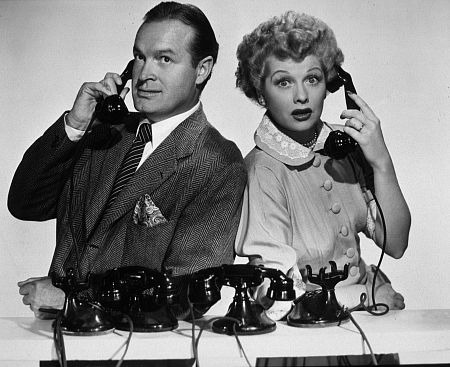
The film was made at Paramount Studios in Hollywood, with location shooting in New York City. This was Lucille Ball’s 70th film!

The New York Times, August 16, 1947. Note that Lucille Ball is not mentioned. (Thanks to @ericthelibrarian for the scan)
THE STORY

Sorrowful Jones (Bob Hope) is a New York bookie who keeps his operation hidden behind a trap door in a Broadway barber shop. He suffers a financial setback when a horse named Dreamy Joe, owned by gangster Big Steve Holloway (Bruce Cabot), unexpectedly wins a race and Jones has to pay all the bettors.
Jones learns that the race was fixed by Big Steve, who tells him about giving the horse a "speedball." It turns out Big Steve has informed all the bookies in his circle of friends about the fixed race, and demands a sum of $1,000 from each one of them in exchange for this information.
Before the next race, Jones learns Dreamy Joe will lose, but still takes bets on the horse from his customers. He even takes a bet from gambler Orville Smith (Paul Lees), who leaves his four-year-old daughter Martha Jane (Mary Jane Saunders) as collateral. Orville overhears a phone call where Big Steve reveals that the race is fixed, so he is killed by one of Big Steve's goons, Once Over Sam (Tom Pedi). Jones is forced to take care of Martha Jane and brings her home with him.
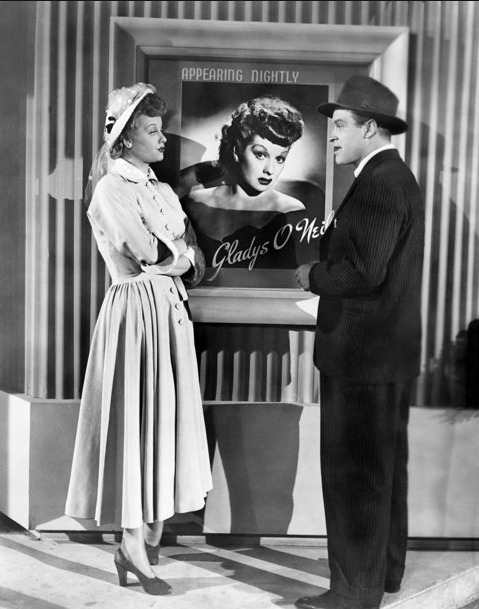
The next day Jones gets help from his ex-girlfriend, burlesque performer Gladys O'Neill (Lucille Ball).
Big Steve tells Jones he is being investigated by the racing commission so he is quitting the race-fixing business. Big Steve plans to make one final race before he gets out of the game, where he is fixing it so that Dreamy Joe will win. He also transfers the ownership of the horse to Martha Jane, unaware that she is Orville's daughter. After the race, Big Steve will kill the horse by giving it a high dose of "speedball."

Jones tries to find Martha Jane's mother, but discovers she is dead. Gladys suggests that Jones give all of Dreamy Joe's winnings to Martha Jane to help her survive, or she will contact the police and tell them about Jones' operation. She has no knowledge of Big Steve's plan to fix the race.
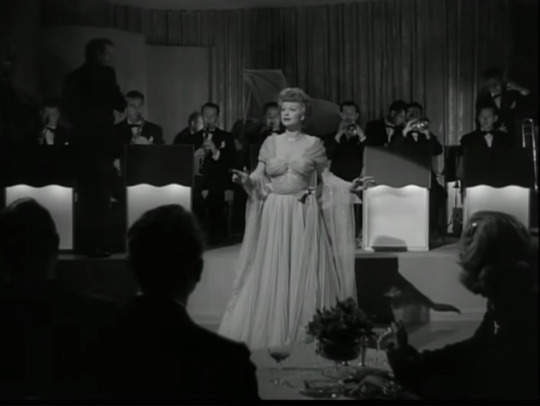
Big Steve finds out that Martha Jane is Orville's daughter, so Jones must hide her to protect her from being killed. When hiding on a fire escape's landing, Martha Jane falls down and is seriously injured. In a coma, the little girl calls out for Dreamy Joe.
In order to save Martha Jane and wake her up, Jones and his partner Regret (William Demarest) steal the horse from Big Steve at the race track. They take it into the hospital room where Martha Jane lies. Martha Jane wakes up and the police find out that Big Steve is responsible for Orville's murder.
After Big Steve is arrested, Jones proposes to Gladys. The police want Martha Jane to be placed in an orphanage, but Jones and Gladys, who have married, decide to adopt the girl. They go away on their honeymoon together with their newly adopted daughter.
TRIVIA & BACKGROUND
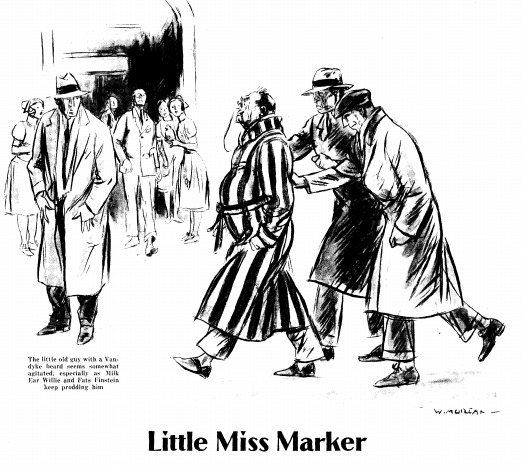
“Little Miss Marker” (1932), a short story by Damon Runyon, inspired the film Sorrowful Jones.

Damon Runyon’s 1940 short story “Little Pinks” served as the basis for the Lucille Ball / Henry Fonda film The Big Street (1942).

Little Miss Marker (1934) starring Adolphe Menjou as Sorrowful Jones and Dorothy Dell as Bangles Carson. Shirley Temple as Marthy Jane. The film was directed by Alexander Hall, Lucille Ball’s one-time fiance.
Sorrowful Jones (1947) starring Bob Hope as Sorrowful Jones and Lucille Ball as Gladys O’Neill. Mary Jane Saunders as Martha Jane.
40 Pounds of Trouble (1962) starring Tony Curtis as Steve McCluskey and Suzanne Pleshette as Chris Lockwood. Claire Wilcox as Penelope Piper.
Little Miss Marker (1980) starring Walter Matthau as Sorrowful Jones and Julie Andrews as Amanda Worthington. Sarah Stimson as the Kid.
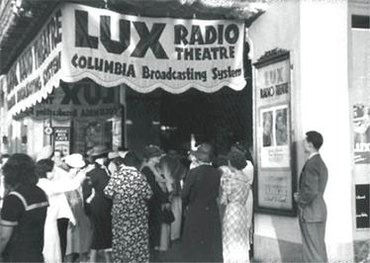
"Lux Radio Theater" broadcast a 60 minute radio adaptation of the movie on November 21, 1949 with Bob Hope and Lucille Ball reprising their film roles.

“Havin' a Wonderful Wish (Time You Were Here)” by Jay Livingston with lyrics by Ray Evans is sung by Lucille Ball (dubbed by Annette Warren).

“Miss Beverley Hills of Hollywood” comic book issue #6, January / February 1947 promoted the film. Lucille Ball still is purporting to have been born in Butte, Montana. Here her birth date is also incorrect: August 6, not August 8. Note how much the Drama Teacher resembles Lucy’s mother, Dede Ball.
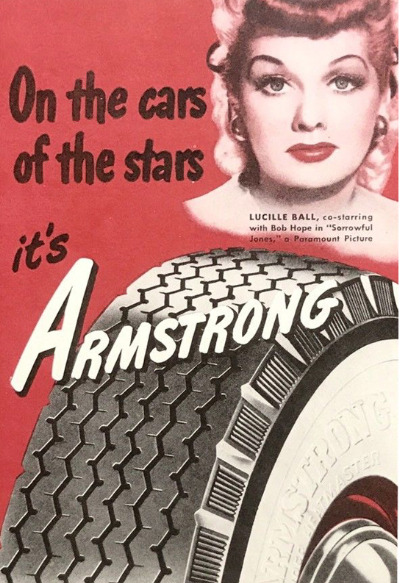
Lucille Ball advertising both Armstrong Tires and Sorrowful Jones.

Lucille Ball advertising Sealright Sanitary Containers using Sorrowful Jones.

In “The Bob Hope Christmas Special” (1973) Lucy opens a small wooden box and removes a lock of Hope’s hair she says she snipped from his head when they were making Sorrowful Jones together.

The film was mentioned when Lucille Ball and Bob Hope guested on “Dinah!” in 1977.

In 1989, after Ball’s passing, a clip from the film was incorporated into “Bob Hope’s Love Affair With Lucy.”
#Lucille Ball#Sorrowful Jones#Little Miss Marker#Bob Hope#Mary Jane Saunders#William Demarest#Damon Runyon#Walter Winchell#Bruce Cabot#Thomas Gomez#1949#Paramount Pictures#Annette Warren#Sidney Landfield#movies#Hollywood#Lucy
4 notes
·
View notes
Text
LUCY ON THE DAIS - Part Two
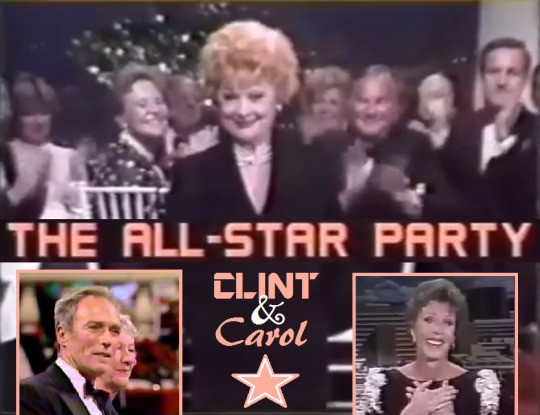
“All-Star Party for Carol Burnett”
December 12, 1982 on CBS
Directed by Dick McDonogh
Produced and Written by Paul Keyes
Music by Nelson Riddle
THE PARTY-GOERS

Carol Burnett (Honoree) got her first big break on “The Paul Winchell Show” in 1955. A years later she was a regular on “The Garry Moore Show.” In 1959 she made her Broadway debut in Once Upon a Mattress, which she also appeared in on television three times. From 1960 to 1965 she did a number of TV specials, and often appeared with Julie Andrews. Her second Broadway musical was Fade Out – Fade In which ran for more than 270 performances. From 1967 to 1978 she hosted her own highly successful variety show, “The Carol Burnett Show.” Lucille Ball made several appearances on “The Carol Burnett Show.” Burnett guest starred in four episodes of “The Lucy Show” and three episodes of “Here’s Lucy,” subsequently playing a character named Carol Krausmeyer. After Lucille Ball’s passing, Burnett was hailed as the natural heir to Lucy’s title of ‘The Queen of TV Comedy.’

Lucille Ball was born on August 6, 1911 in Jamestown, New York. She began her screen career in 1933 and was known in Hollywood as ‘Queen of the B’s’ due to her many appearances in ‘B’ movies. With Richard Denning, she starred in a radio program titled “My Favorite Husband” which eventually led to the creation of “I Love Lucy,” a television situation comedy in which she co-starred with her real-life husband, Latin bandleader Desi Arnaz. The program was phenomenally successful, allowing the couple to purchase what was once RKO Studios, re-naming it Desilu. When the show ended in 1960 (in an hour-long format known as “The Lucy-Desi Comedy Hour”) so did Lucy and Desi’s marriage. In 1962, hoping to keep Desilu financially solvent, Lucy returned to the sitcom format with “The Lucy Show,” which lasted six seasons. She followed that with a similar sitcom “Here’s Lucy” co-starring with her real-life children, Lucie and Desi Jr., as well as Gale Gordon, who had joined the cast of “The Lucy Show” during season two. Before her death in 1989, Lucy made one more attempt at a sitcom with “Life With Lucy,” also with Gordon, which was not a success and was canceled after just 13 episodes.
Monty Hall – Chairman of Variety Clubs International
Carol Burnett's Family (center table)
Joe Hamilton – Carol's Husband
Erin Hamilton – Carol and Joe's daughter (age 14)
Jody Hamilton – Carol and Joe's daughter (age 15)
Carrie Hamilton – Carol and Joe's daughter (age 19)
Credited Entertainers & Speakers (with credits shared with Carol Burnett)
Tim Conway - “The Carol Burnett Show” (1967-78)
*Sammy Davis Jr. - “The Carol Burnett Show” (1975 & 1976), “Sammy & Co.” (1976)
Bette Davis
Glenda Jackson – HealtH (1980)
*Steve Lawrence - “The Garry Moore Show” (1959-63), “The Carol Burnett Show” (1967-78)
Vicki Lawrence - “The Carol Burnett Show” (1967-78)
*Jim Nabors - “The Carol Burnett Show” (1967-76), “Gomer Pyle: USMC” (1967 & 1969), “The Jim Nabors Hour” (1969 & 1970), “The Jim Nabors Show” (1978)
Jack Paar - “The Jack Paar Tonight Show” (1957-58)
Burt Reynolds - “The Carol Burnett Show” (1972), “Evening Shade” (1993)
Nelson Riddle and his orchestra
Tom Selleck - “Magnum P.I.” (1984 & 1988)
Beverly Sills - “Sills & Burnett at the Met” (1976)
James Stewart - “The Joey Bishop Show” (1969), “A Special Evening with Carol Burnett” (1978)
Uncredited Attendees (with credits shared with Carol Burnett)
Steve Allen
Loni Anderson
Fred Astaire
Ned Beatty
Sammy Cahn
*Ellen Corby
Altovise Davis – Wife of Sammy Davis Jr.
Dom DeLuis
Angie Dickinson
Mike Douglas
Morgan Fairchild
Zsa Zsa Gabor
Harold Gould
Florence Henderson
Ted Lange
Michele Lee
*Dick Martin
*Jayne Meadows
Rita Moreno
Lynn Redgrave
Jean Stapleton
Loretta Switt
*Danny Thomas
Daniel J. Travanti
Abe Vigoda
Betty White
* Appeared with Lucille Ball on one of her television series'

Two years later, “All-Star Party for Lucille Ball” also featured Monty Hall, Sammy Davis Jr., Burt Reynolds, James Stewart, and Vicki Lawrence.

Variety, the Children’s Charity is an organization founded in Pittsburgh, Pennsylvania in 1927, when a group of eleven men involved in show business set up a social club which they named the Variety Club. On Christmas Eve 1928, a baby was left on the steps of the Sheridan Square Film Theatre. When efforts to trace the mother failed, the Variety Club named the child Catherine Variety Sheridan, after the club and the theatre on whose steps she was found, and undertook to fund the child’s living expenses and education. Later the club decided to raise funds for other disadvantaged children. The discovery of the baby inspired the film Variety Girl (1947).

In 1986, Ball served as Hostess for the “All-Star Party for Clint Eastwood.”
THE ALL-STAR PARTY
Previous “All-Star Party” honoree 1981 Burt Reynolds introduces the show. After the first commercial break, Lucille Ball is introduced. She kisses Carol and walks to the stairs to speak. While she does, Carol bows to her as 'the Queen of Comedy.'
Lucy says they are there to honor three women:
Carol Burnett, the singer
Carol Burnett, the legitimate actress, and
Carol Burnett, the comedienne
Lucy: “Good for you, kid. You've done it all, and you've done it well.”
Carol Burnett would often remark how Lucy affectionately called her 'kid'. Lucy reads a letter from the White House signed by Ronald Reagan. Reagan would be the guest of honor in 1983. He would also send notes of congratulations and regrets in 1984 (for Lucille Ball) and 1986 (for Clint Eastwood). The latter two notes were read by Cary Grant.
Lucy introduces Sammy Davis Jr. Sammy wanted to sing, but defers to Steve Lawrence, who sings Cole Porter's “You're The Top” with special lyrics for the occasion by Sammy Cahn.
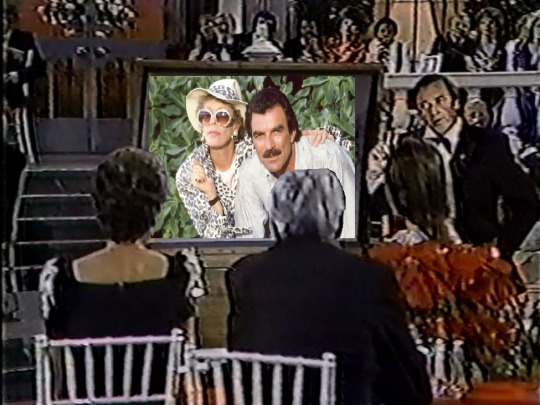
Jim Nabors wheels on a large projection TV and Tom Selleck (in a Hawaiian shirt, naturally) appears on it to pay tribute to Burnett. His seductive tone causes Carol to cuddle up to the TV set.
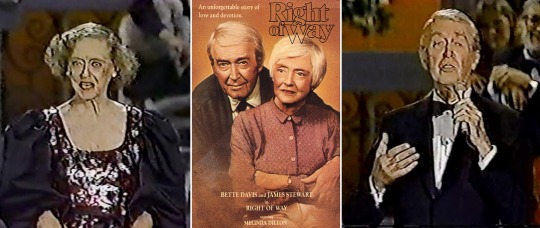
Nabors brings on Bette Davis if, for no other reason, to introduce Jimmy Stewart. Davis and Stewart had just done a picture together, the TV film Right of Way, released in 1983. It was Stewart's penultimate screen acting role. Surprisingly, Davis says that Stewart will sing!
Jimmy Stewart, not known as a singer, croons Cole Porter's “Easy to Love,” the evening's second song from the 1934 stage musical Anything Goes. The song was also included in the 1936 film Born To Dance starring Stewart and Eleanor Powell (whose voice was dubbed). Stewart manages to get through the first chorus (although sadly out of key). For the second chorus he asks that the lights be dimmed so it is just him singing to Burnett. It is a truly intimate and lovely moment considering that the only time the two ever saw each other was on award, talk, or tribute shows. Burnett and Stewart never appeared together in a dramatic context.

After a break, Tim Conway does an elaborate comedy bit with a bank of telephones designed for viewers to call in to pay tribute to Carol. Despite the large number of phones (and corresponding lights) – no one calls. Conway reads Carol a telegram from Garry Moore.
Jack Paar talks about their early days on “The Tonight Show” and recalls Burnett singing “I Was A Fool For John Foster Dulles” by Kenny Welsh in August 1958. Paar introduces Vicki Lawrence to re-create the song.
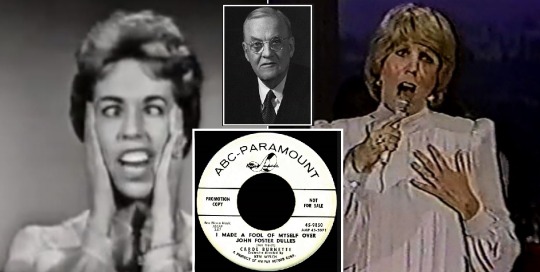
John Foster Dulles served as United States Secretary of State under President Dwight D. Eisenhower from 1953 to 1959. He was a significant figure in the early Cold War era, advocating an aggressive stance against communism throughout the world.
Glenda Jackson steps out to unveil a photograph of the UCLA Medical Center where a wing will be renamed the Carol Burnett Wing for Handicapped Children.
Carol expresses her thanks to everyone. She tells how she and her grandmother used to go to the movies to see many of the folks in the room: Jimmy Stewart, Lucille Ball, Fred Astaire, and Bette Davis.
Carol is coaxed into singing her theme song “I'm So Glad We Had This Time Together.” Another voice joins in from behind her – it is her old friend opera singer Beverly Sills. The song continues, with special lyrics for the occasion (likely written by Sammy Cahn).
This Date in Lucy History – December 12
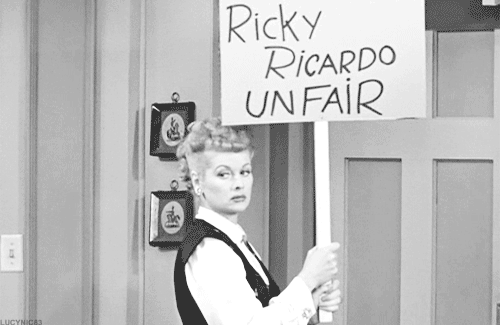
“Ricky's European Booking” (ILL S5;E10) – December 12, 1955
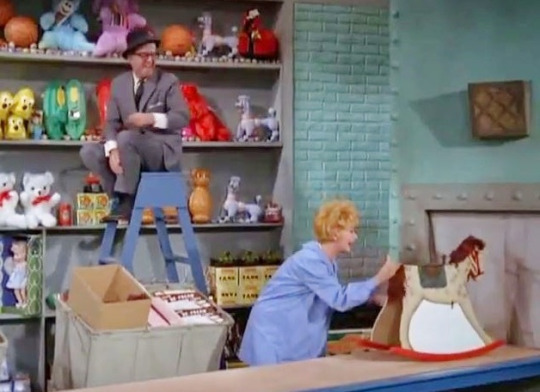
"Lucy and the Efficiency Expert" (TLS S5;E13) – December 12, 1966
#All-Star Party for Carol Burnett#Carol Burnett#Lucille Ball#Monty Hall#Variety Clubs#Joe Hamilton#Nelson Riddle#Sammy Cahn#Tim Conway#Carrie Hamilton#Bette Davis#Jimmy Stewart#Glenda Jackson#Steve Lawrence#Vicki Lawrence#Sammy Davis Jr.#Burt Reynolds#Jack Paar#Jim Nabors#Tom Selleck#Beverly Sills#fred astaire#Steve Allen#Jayne Meadows#ronald reagan#1982#CBS#TV
3 notes
·
View notes
Text
THE SURPRISE PARTY
March 10, 1951

“The Surprise Party” is episode #122 of the radio series MY FAVORITE HUSBAND broadcast on March 10, 1951.
Synopsis ~ Iris lets slip that one of Liz's friends is throwing a party Saturday night, and Liz and George aren't invited. But which friend is it?

“My Favorite Husband” was based on the novels Mr. and Mrs. Cugat, the Record of a Happy Marriage (1940) and Outside Eden (1945) by Isabel Scott Rorick, which had previously been adapted into the film Are Husbands Necessary? (1942). “My Favorite Husband” was first broadcast as a one-time special on July 5, 1948. Lucille Ball and Lee Bowman played the characters of Liz and George Cugat, and a positive response to this broadcast convinced CBS to launch “My Favorite Husband” as a series. Bowman was not available Richard Denning was cast as George. On January 7, 1949, confusion with bandleader Xavier Cugat prompted a name change to Cooper. On this same episode Jell-O became its sponsor. A total of 124 episodes of the program aired from July 23, 1948 through March 31, 1951. After about ten episodes had been written, writers Fox and Davenport departed and three new writers took over – Bob Carroll, Jr., Madelyn Pugh, and head writer/producer Jess Oppenheimer. In March 1949 Gale Gordon took over the existing role of George’s boss, Rudolph Atterbury, and Bea Benaderet was added as his wife, Iris. CBS brought “My Favorite Husband” to television in 1953, starring Joan Caulfield and Barry Nelson as Liz and George Cooper. The television version ran two-and-a-half seasons, from September 1953 through December 1955, running concurrently with “I Love Lucy.” It was produced live at CBS Television City for most of its run, until switching to film for a truncated third season filmed (ironically) at Desilu and recasting Liz Cooper with Vanessa Brown.
MAIN CAST

Lucille Ball (Liz Cooper) was born on August 6, 1911 in Jamestown, New York. She began her screen career in 1933 and was known in Hollywood as ‘Queen of the B’s’ due to her many appearances in ‘B’ movies. With Richard Denning, she starred in a radio program titled “My Favorite Husband” which eventually led to the creation of “I Love Lucy,” a television situation comedy in which she co-starred with her real-life husband, Latin bandleader Desi Arnaz. The program was phenomenally successful, allowing the couple to purchase what was once RKO Studios, re-naming it Desilu. When the show ended in 1960 (in an hour-long format known as “The Lucy-Desi Comedy Hour”) so did Lucy and Desi’s marriage. In 1962, hoping to keep Desilu financially solvent, Lucy returned to the sitcom format with “The Lucy Show,” which lasted six seasons. She followed that with a similar sitcom “Here’s Lucy” co-starring with her real-life children, Lucie and Desi Jr., as well as Gale Gordon, who had joined the cast of “The Lucy Show” during season two. Before her death in 1989, Lucy made one more attempt at a sitcom with “Life With Lucy,” also with Gordon.
Richard Denning (George Cooper) was born Louis Albert Heindrich Denninger Jr., in Poughkeepsie, New York. When he was 18 months old, his family moved to Los Angeles. Plans called for him to take over his father’s garment manufacturing business, but he developed an interest in acting. Denning enlisted in the US Navy during World War II. He is best known for his roles in various science fiction and horror films of the 1950s. Although he teamed with Lucille Ball on radio in “My Favorite Husband,” the two never acted together on screen. While “I Love Lucy” was on the air, he was seen on another CBS TV series, “Mr. & Mrs. North.” From 1968 to 1980 he played the Governor on “Hawaii 5-0″, his final role. He died in 1998 at age 84.
Gale Gordon (Rudolph Atterbury) had worked with Lucille Ball on “The Wonder Show” on radio in 1938. One of the front-runners to play Fred Mertz on “I Love Lucy,” he eventually played Alvin Littlefield, owner of the Tropicana, during two episodes in 1952. After playing a Judge in an episode of “The Lucy-Desi Comedy Hour” in 1958, he would re-team with Lucy for all of her subsequent series’: as Theodore J. Mooney in ”The Lucy Show”; as Harrison Otis Carter in “Here’s Lucy”; and as Curtis McGibbon on “Life with Lucy.” Gordon died in 1995 at the age of 89.
Bea Benadaret (Iris Atterbury) was considered the front-runner to be cast as Ethel Mertz but when “I Love Lucy” was ready to start production she was already playing a similar role on TV’s “The George Burns and Gracie Allen Show” so Vivian Vance was cast instead. On “I Love Lucy” she was cast as Lucy Ricardo’s spinster neighbor, Miss Lewis, in “Lucy Plays Cupid” (ILL S1;E15) in early 1952. Later, she was a success in her own show, “Petticoat Junction” as Shady Rest Hotel proprietress Kate Bradley. She starred in the series until her death in 1968.
Ruth Perrott (Katie, the Maid) is not heard in this episode.
Bob LeMond (Announcer) also served as the announcer for the pilot episode of “I Love Lucy”. When the long-lost pilot was finally discovered in 1990, a few moments of the opening narration were damaged and lost, so LeMond ��� fifty years later – recreated the narration for the CBS special and subsequent DVD release.
GUEST CAST

Elvia Allman (Sally Roman) was born on September 19, 1904 in Enochville, North Carolina. She started her performing career on radio in the 1920s, as both a storyteller and singer. Allman’s first episode of “I Love Lucy” is also one of the most memorable in TV history: “Job Switching” (ILL S2;E1) in September 1952. She played the strident foreman of Kramer’s Candy Kitchen. Allman returned to the show as one of Minnie Finch’s neighbors in “Fan Magazine Interview” (ILL S3;E17) in 1954. Changing gears once again she played prim magazine reporter Nancy Graham in “The Homecoming” (ILL S5;E6) in 1955. She made two appearances on “The Lucy–Desi Comedy Hour“ - first as Ida Thompson, Westfield’s PTA director in “The Celebrity Next Door” (LDCH S1;E2) and as Milton Berle’s secretary when “Milton Berle Hides Out at the Ricardos” (LDCH S3;E1) in 1959. On “The Lucy Show” she was seen in “Lucy Bags a Bargain” (TLS S4;E17) and in “Lucy The Babysitter” (TLS S5;E16). Allman died on March 6, 1992, aged 87.

Shirley Mitchell (Fran Lewis) was born in Toledo, Ohio, on November 4, 1919. She started her acting career on radio in Chicago but soon moved to Los Angeles. Mitchell was a regular on radio in series such as “Fibber McGee and Molly” and “The Great Gildersleeve”. She became friends with Lucille Ball in the late 1940s when she was featured in four episodes of “My Favorite Husband.” Mitchell reunited with Lucille Ball on “I Love Lucy” playing Marion Strong, a member of the Wednesday Afternoon Fine Arts League in “Lucy and Ethel Buy the Same Dress” (ILL S3;E3), “Lucy Tells the Truth” (ILL S3;E6) and “Lucy’s Club Dance” (ILL S3;E25). Shirley Mitchell died of heart failure on November 11, 2013, seven days after her 94th birthday.
Fran’s husband is named Tom, although we do not meet him.
EPISODE
ANNOUNCER: “As we look in on the Coopers tonight, George and Liz have just finished dinner.”
Liz remarks on this being the first time they’ve stayed home in three weeks.
LIZ: “The way we’ve been going you’d think the government was going to ration fun.”

Rationing in the US was introduced in stages during World War II. The Office of Price Administration (OPA) warned Americans of potential gasoline, steel, aluminum, and electricity shortages. Most rationing restrictions ended in August 1945 except for sugar rationing, which lasted until 1947 in some parts of the country.
The telephone rings and George tells Liz they should just let it ring, lest someone tempt them out of their homes.
LIZ: “Maybe it’s ‘Sing It Again’ and we’re losing a jackpot.”

"Sing It Again” first aired on CBS radio in September 1948. In several markets it was aired right after “My Favorite Husband,” which was true of this particular date (March 10, 1951). It worked like this: a song would be performed, then sung again (hence the show's title) with new lyrics, describing a famous celebrity. If the contestant (or a listener, phoned at random) solved the puzzle, they would have the opportunity to try to identify the ‘Phantom Voice’ from clues from the preceding weeks. The jackpot was huge for its time: $25,000 in cash and prizes. In 1950, it became one of the few programs ever to be simulcast on both radio and television.
George tells her to grit her teeth, but Liz can’t bear it and picks up the phone. It is only Iris. She is calling to ask Liz what she will wear to the party on Saturday night. Before Liz can ask “what party” Iris realizes Liz may not have been invited. Iris quickly hangs up before explaining. Liz wonders who it is giving the party and why they weren’t invited. She doesn’t want to go, but wants to know who doesn’t like them enough not to invite them to a party. She dissolves into tears. George doesn’t care, but Liz can’t sleep until she knows who it is.

Liz calls Sally Roman (Elvia Allman), who, Liz says, is invited everywhere. She will undoubtedly spill the beans. Sally says she is going to the party on Saturday night, but doesn’t say where or who is throwing it.
SALLY: “Well, she’s your best friend!”
Liz wonders if they are talking about the same party to get her to say a name - but she doesn’t bite. Liz calls Iris back but Iris hangs up! Liz won’t quit - she continues dialing as the scene fades out.
After 17 phone calls, Liz still hasn’t found out who is throwing the party. She tells George to put on his coat; they are going to confront Iris - despite it being ten o’clock at night! Liz says she can’t sleep until she finds out where it is they’re not going.
End of Part One

A public service announcement talks about community spirit in Western Germany, where US GIs built a playground for a children’s home in a town heavily bombed during the war. “We are Americans. As we go, so goes America.”
Part Two
ANNOUNCER: “As we look in on the Coopers once again, we find them on their way over to the Atterburys. The Atterburys, not knowing that they are going to have the pleasure of late evening visitors, have already gone to bed.”
Rudolph and Iris are snoring loudly in bed when the phone rings. Rudolph picks it up but no one is there. He realizes it is the front doorbell. Rudolph reluctantly goes to answer the door - without his bedroom slippers - stubbing his toe. Liz and George are at the door. Liz wants to ask Iris something, so Rudolph begrudgingly invites them in. Iris comes down to see who it is. Liz bluntly asks her who is having the party on Saturday night. Iris says she can’t tell her.
LIZ: “Who? Who? Who?” RUDOLPH: “George, will you take your owl and go home?”

A variation on this owl joke was used on the very first episode of “I Love Lucy,” “The Girls Want To Go To a Nightclub” (ILL S1;E1):
ETHEL MERTZ (to Lucy, who is dialing the phone): “Who are you calling? Who, who, who?” LUCY RICARDO: “Quiet, you sound like an owl.”
And repeated in a new context on season one of “The Lucy Show,” “Lucy Buys a Sheep” (TLS S1;E5):
VIV BAGLEY: “Who got dinner last night? Who did the laundry last week? Who did the marketing yesterday? Who? Who?” LUCY CARMICHAEL: “Apparently some crabby blonde owl.”
Liz gets Iris to tell her that the ‘friend’ lives three blocks away from the Coopers. Liz is satisfied that she can figure it out from that clue. Rudolph falls asleep immediately - standing up! Next morning, Liz’s breakfast is getting cold. She can’t stop thinking about the mystery party-thrower. She has come to the conclusion that it must be Fran Lewis. Now she has to call Fran and wangle an invitation. She doesn’t want to go - just to get invited - so she can decline!

On the telephone, Fran (Shirley Mitchell) says she was just about to call Liz - about her missing cat. Liz invites her over to her house on Saturday night, knowing she’d have no choice but to invite her to the party Liz thinks she’s giving. But no - Fran accept her invitation. Liz hangs up.
GEORGE: “Well? Did you find out who is giving the party?” LIZ: “Yes. We are! My little plan backfired!”
At the bank, Mr. Atterbury tells George that he only got three hours sleep last night due to heart-burn, which she attributes to Liz. Rudolph confides in George that the girls in the club are giving the party on Saturday night - in Liz’s honor. The party is being given at Marge Van Tassel’s on Saturday night. George calls Liz and tells her the truth about the party and that it is in her honor.
Later, Liz is talking to Fran on the phone. She tells Fran that her mother fell down and broke her leg so they have to break their plans for Saturday night. That takes care of that! Now all she has to do is wait for Marge’s invitation!
GEORGE: “Sometimes you amaze me.” LIZ: “Sometimes I amaze myself!”
End of Episode
#My Favorite Husband#Lucille Ball#Richard Denning#Gale Gordon#Bea Bendaret#Elvia Allman#Shirley Mitchell#Rationing#Sing It Again#Radio#CBS#owl#Bob Lemond
0 notes
Text
THE BOB HOPE CHEVY SHOW
October 21, 1956
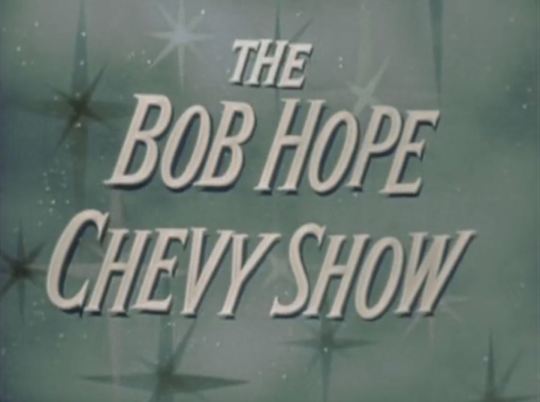
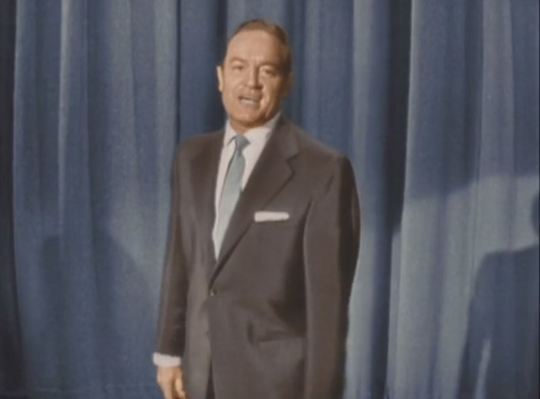
Bob Hope (Himself / Ricky Ricardo) was born Lesley Townes Hope in England in 1903. During his extensive career in virtually all forms of media he received five honorary Academy Awards. In 1945 Desi Arnaz was the orchestra leader on Bob Hope’s radio show. Ball and Hope did four films together. He appeared as himself on the season 6 opener of “I Love Lucy.” He did a brief cameo in a 1964 episode of “The Lucy Show.” When Lucille Ball moved to NBC in 1980, Hope appeared on her welcome special. He died in 2003 at age 100.
Lucille Ball (Lucy Ricardo) was born on August 6, 1911 in Jamestown, New York. She began her screen career in 1933 and was known in Hollywood as ‘Queen of the B’s’ due to her many appearances in ‘B’ movies. With Richard Denning, she starred in a radio program titled “My Favorite Husband” which eventually led to the creation of “I Love Lucy,” a television situation comedy in which she co-starred with her real-life husband, Latin bandleader Desi Arnaz. The program was phenomenally successful, allowing the couple to purchase what was once RKO Studios, re-naming it Desilu. When the show ended in 1960 (in an hour-long format known as “The Lucy-Desi Comedy Hour”) so did Lucy and Desi’s marriage. In 1962, hoping to keep Desilu financially solvent, Lucy returned to the sitcom format with “The Lucy Show,” which lasted six seasons. She followed that with a similar sitcom “Here’s Lucy” co-starring with her real-life children, Lucie and Desi Jr., as well as Gale Gordon, who had joined the cast of “The Lucy Show” during season two. Before her death in 1989, Lucy made one more attempt at a sitcom with “Life With Lucy,” also with Gordon, which was not a success and was canceled after just 13 episodes.
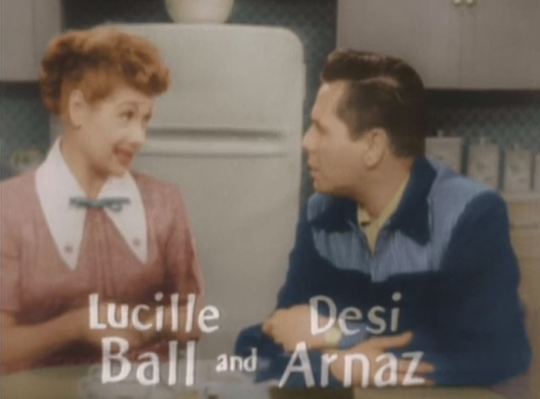
Desi Arnaz (Fred Mertz) was born in Cuba in 1917 and immigrated to America as a youngster. He was a musician who married Lucille Ball in 1940 after meeting her on the set of 1939’s Too Many Girls, which he had done on stage in New York. In order to keep him ‘off the road’ Ball convinced producers to cast him as her husband in a new television project based on her radio show “My Favorite Husband.” The network was convinced. In 1951, Arnaz and Ball began playing Lucy and Ricky Ricardo, roles they would be identified with for the rest of their lives. The couple had two children together, Lucie and Desi Jr. In 1960, Ball and Arnaz divorced. Desi became a producer, responsible for such hits as “The Mothers-in-Law” (1967-69). He re-married in 1963. Desi Aranz died in 1986, just a few years before Ball.
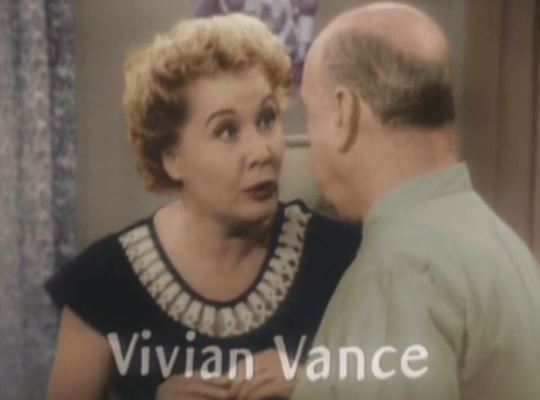
Vivian Vance (Ethel Mertz) was born Vivian Roberta Jones in Cherryvale, Kansas in 1909, although her family quickly moved to Albuquerque, New Mexico where she was raised. She had extensive theatre experience, co-starring on Broadway with Ethel Merman in Anything Goes. She was acting in a play in Southern California when she was spotted by Desi Arnaz and hired to play Ethel Mertz, Lucy Ricardo’s neighbor and best friend. The pairing is credited with much of the success of “I Love Lucy.” Vance was convinced to join the cast of “The Lucy Show” in 1962, but stayed with the series only through season three, making occasional guest appearances afterwards. She made a total of six appearance on “Here’s Lucy.” She also joined Lucy for a TV special “Lucy Calls the President” in 1977. Vance died two years later.
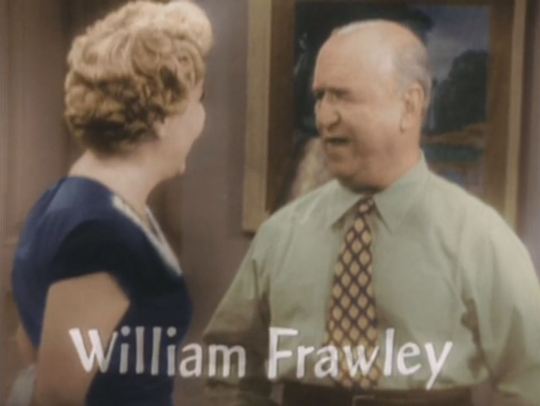
William Frawley (Captain Blystone) was already a Hollywood veteran when he was hired by Desi Arnaz to play Fred Mertz on “I Love Lucy.” After the series concluded he joined the cast of “My Three Sons” playing Bub Casey. He did an episode of “The Lucy Show” in October 1965 which was his final TV appearance before his death in March 1966.
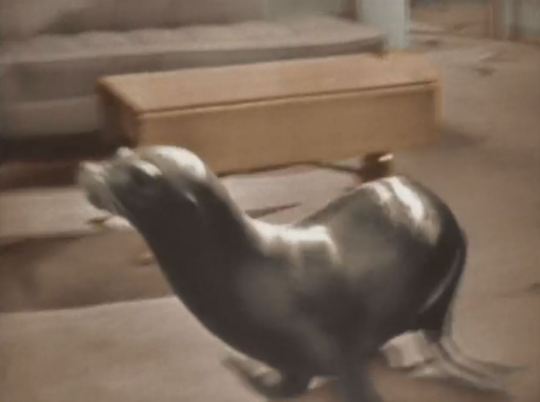
Tommy (Trained Seal) Others guests on the show that evening were James Cagney, Diana Dors, New York Yankee Don “No Hit” Larsen, and Les Brown and his Band of Renown.
The Hollywood DebStars (up and coming young women in the entertainment business nominated by the make-up industry) include:
Nicola Michaels aka Niki Dantine (from MGM)
Elaine Aikens aka Elaine Aiken (from Paramount)
Dani Crayne (from Warner Brothers)
Anna Navarro (from NBC)
Nancy Kilgas (from CBS)
Roxanne Arlen (from Pine Talent Productions)
Stephanie Griffin (from DelBar Productions)
Carol Nugent (from American National Studios)
Autumn Russell (from Al Wallace)
Veneita Stevenson (from RKO)
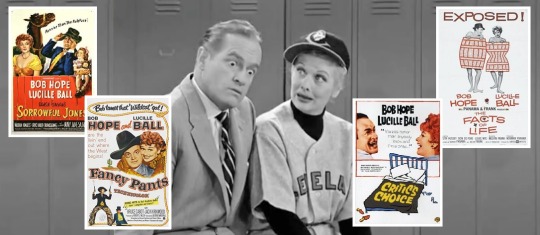
This cross-over episode of “The Bob Hope Show” aired on NBC (Hope's network of choice) two weeks after his guest-star appearance as himself on the season six opener of “I Love Lucy.”
Because the show is sponsored by Chevrolet, the opening theme is their jingle “See the U.S.A. In a Chevrolet” by Leo Corday and Leon Carr. Dinah Shore sang the song after 1952, and it became something of a signature song for her. Later the song was also sung by Pat Boone on his “Pat Boone-Chevy Showroom” (1957-60) on ABC. Hope's signature tune “Thanks for the Memory” by Ralph Rainger is saved for the closing credits, with special lyrics about the 1957 Chevies.
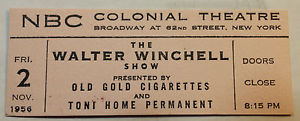
In Hope's opening monologue, he promises a look at the new 1957 Chevrolet cars. He then alludes to the new TV season. Hope wonders who is running the country with Walter Winchell on TV and IKE out campaigning. Winchell's new NBC variety series was titled “The Walter Winchell Show” and it premiered three days before this “The Bob Hope Chevy Show.” It lasted just one season. A month after Hope mentioned IKE campaigning, Eisenhower handily won election to a second term as US President.
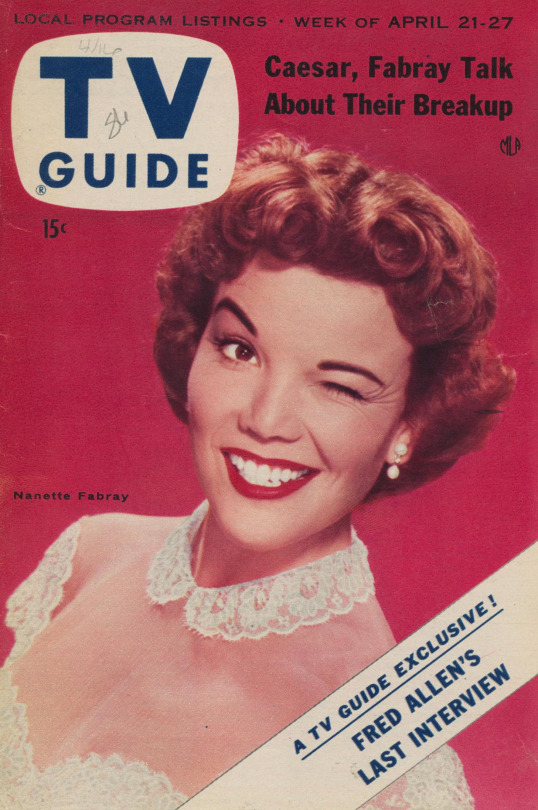
Hope says that Sid Caesar's back – with a new wife. Hope is referring to the third season of NBC's “Caesar's Hour.” Nanette Fabray left the show after a misunderstanding when her business manager, unbeknownst to her, made unreasonable demands during contract renewal negotiations. Fabray and Caesar did not reconcile until years later. Fabray appeared with Lucille Ball in the her 1974 special “Happy Anniversary and Goodbye.”
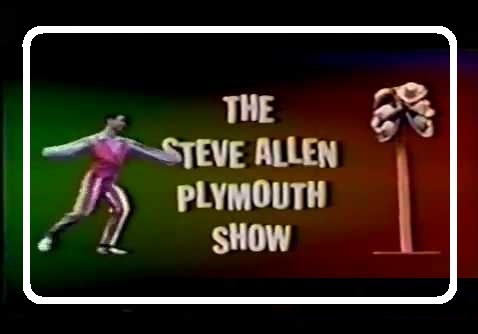
Hope says that Steve Allen is back and busy as ever. Allen's new show on NBC was titled “The Steve Allen Plymouth Show” (another show sponsored by a car manufacturer) and would run five seasons. Steve Allen interviewed Lucy Whittaker (Lucille Ball) in 1977′s “Lucy Calls the President.”
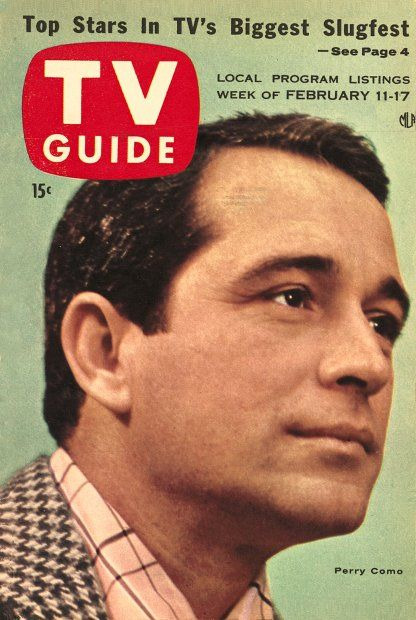
Hope also reports that Perry Como is back. Hope is referring to Como's hosting of “The Kraft Music Hall.” Como appeared on the premiere of the aforementioned “Walter Winchell Show” to promote the “Kraft Music Hall.”
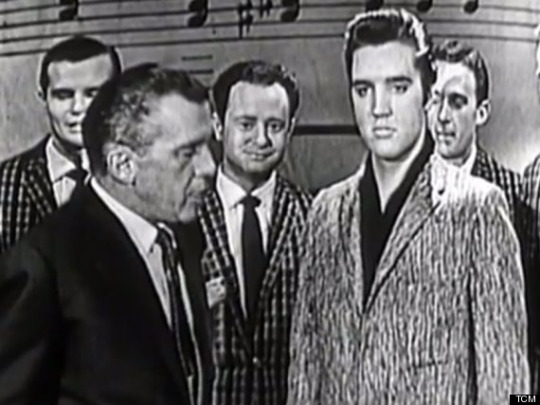
Trying to make a joke about “The Ed Sullivan Show” (which he says “owns Sunday nights), Hope mistakenly says “Elvin Presley” instead of “Elvis Presley.”
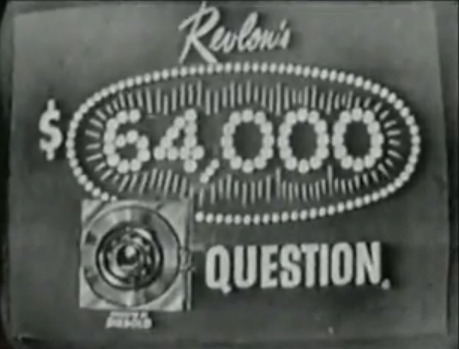
Hope does a joke about Winston Churchill's son being on “The $64,000 Question.” On September 18, 1956, a month before this Bob Hope Show first aired, Rudolph Churchill was a guest contestant on the American quiz show hosted by Lucille Ball's friend Hal March. Churchill and the other contestants all got the answers right that evening and it was discovered that they were already given the answers. This began what is know as the quiz show scandals in Hollywood.
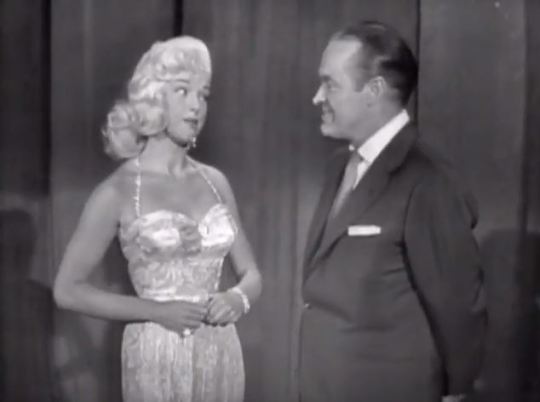
English-born Diana Dors does a sketch where she plays Hope's wife in a traditional English cottage. Dors and Hope then do a companion sketch about a married couple in modern day America where the house practically cleans itself. They even have a baby (several) thanks to automation.
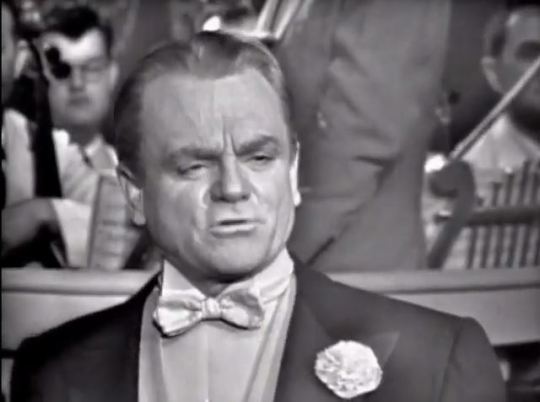
Hope and Cagney sing and dance to “Mary's a Grand Old Name” by George M. Cohan. Cagney won an Oscar for playing George M. Cohan in the 1942 film Yankee Doodle Dandy, which also featured the song. It was also in the film The Seven Little Foys (1955), which is mentioned by Hope. Cagney says he is doing a new film about Lon Chaney called Man of a Thousand Faces. It was released in 1957. Hope also makes a joke about Burt Lancaster's 1956 film Trapeze.

During Hope and Cagney’s introductions of the DebStars, background singers perform “A Pretty Girl Is Like A Melody,” “You Oughta Be in Pictures” and “You Are Too Lovely.”
After ogling the DebStars, Cagney does an imitation of Ernest Borgnine saying “What're you doin' tonight, Marty?” from the 1955 film Marty. About Cagney, Hope says he's such a tough guy that he thinks Somebody Up There Likes Me is a comedy. The dramatic 1956 film is about the life of boxer Rocky Graziano.
Hope rightfully states that he knew Lucy long before she met Desi and wonders what it would be like if he'd married Lucy. This sets up the premise of the “I Love Lucy” cross-over sketch that follows.
The “I Love Lucy” theme is played at the start of the sketch.
Although the “I Love Lucy” set is used, it is slightly changed to accommodate the action. There are now closet doors at the extreme left and right edge of the set. The set dressing in the hallway is also different.
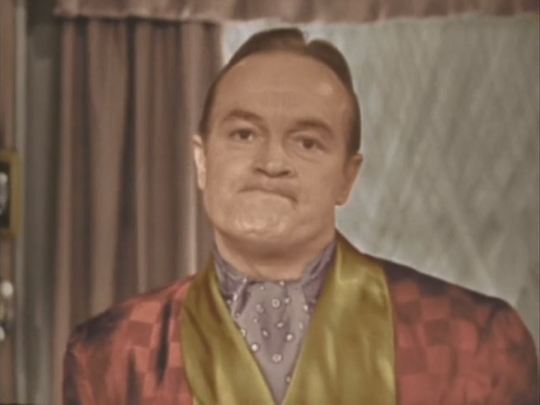
The sketch was probably recorded in advance, possibly on the “I Love Lucy” stage, to accommodate the cast, including the live seal. This is born out by the fact that during Hope's “curtain call” during the final credits, only William Frawley and Vivian Vance come out to shake Hope's hand, and they are dressed in different clothes than they were wearing moments before. Lucille Ball and Desi Arnaz do not appear as “themselves” out of context of the characters they play in the sketch.
The action opens on the Ricardo's New York City apartment with Lucy leading a live seal from the front door into the living room closet. Ball has some trouble getting the seal through the closet door, despite tempting it with food.
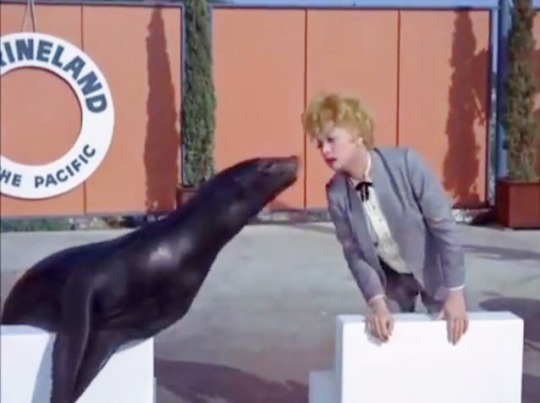
Lucille Ball would work with live seals again in “Lucy at Marineland” (TLS S4;E1).
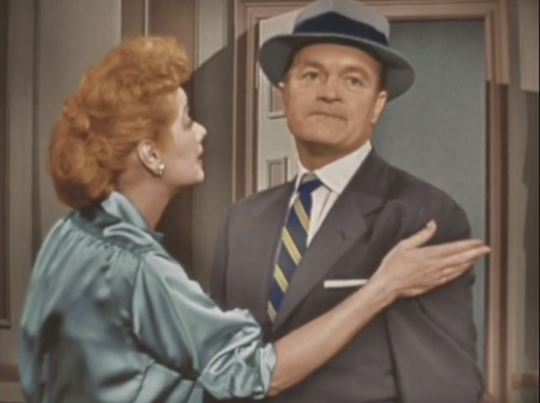
When Ricky (Bob Hope) comes home, Lucy smothers him with kisses, which makes him suspicious that something is up.
Lucy: “What are you talking about? I give you a kiss every day.” Ricky: “I know, but this is October. You just kissed me through Lincoln's Birthday.”
Lincoln's Birthday was formerly a Federal holiday celebrated on February 12. It is now marked only in select states, having been replaced by Presidents’ Day at the Federal level.
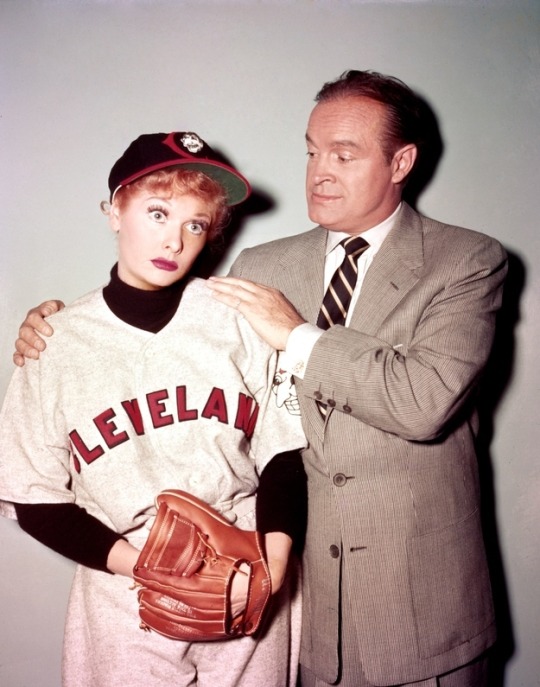
When Ricky tosses his hat into the closet where the seal is hiding, it immediately comes flying back at him, nearly landing back on his head, but missing.
Lucy: “We've got termites!” Ricky: “One of them must pitch for Cleveland.”
Hope was part-owner of the Cleveland Indians, and never missed an opportunity to joke about the team.
Lucy says she was just trying to help by getting the closet fumigated.
Ricky: “You're always helping, like when we went on our honeymoon. You thought we'd be lonesome so you invited your mother along.” Lucy: “I was just trying to help.” Ricky: “Who were you helping? You're father?”
While Lucy Ricardo's mother was an integral part of “I Love Lucy” in its last few seasons, her father was never mentioned. In real-life, Lucille Ball's father died when she was an infant and she was raised by her grandfather. Like most cross-overs, Hope's writers appear not to have been avid watchers of “I Love Lucy.”
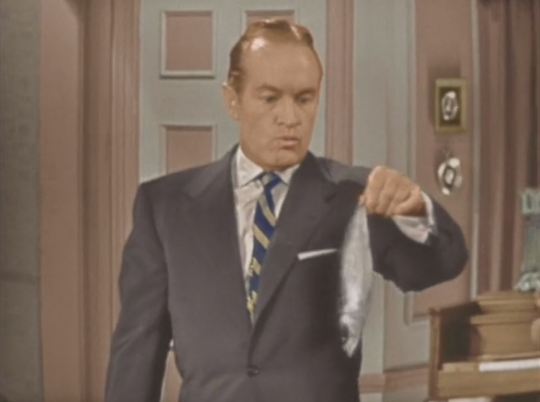
Seeing a plate of whole fish (the seal's food) on the coffee table, Ricky gets suspicious. He calls them “Texas anchovies.” Lucy explains that they are her first dividend from her membership in the Herring of the Month Club.
Ricky says he has an audition in the morning for the 100-piece Havana Symphony Orchestra: 99 bongos and a sweet potato.
When Fred enters (played by Desi Arnaz), Lucy barely recognizes him:
Lucy: “Well Fred, I didn't recognize you. You look like a new man. Took off a little weight, put on a little hair.”
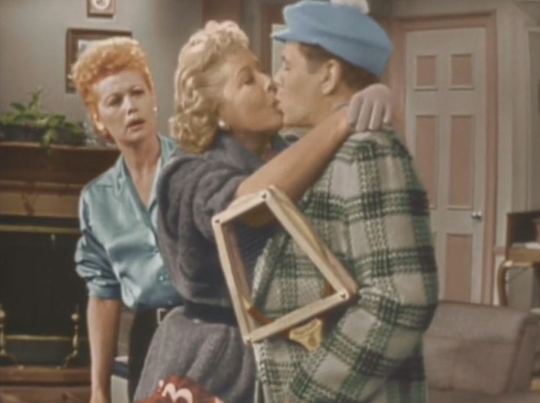
When Ethel smothers Fred (Ricky) in kisses, Lucy (or Lucille Ball) says “All right, break it up. Let's not overdo it.” On “I Love Lucy,” Vivian Vance did not enjoy having to be affectionate with William Frawley. If the script required them to smooch, an air kiss was all Frawley and Vance would do - and that reluctantly.
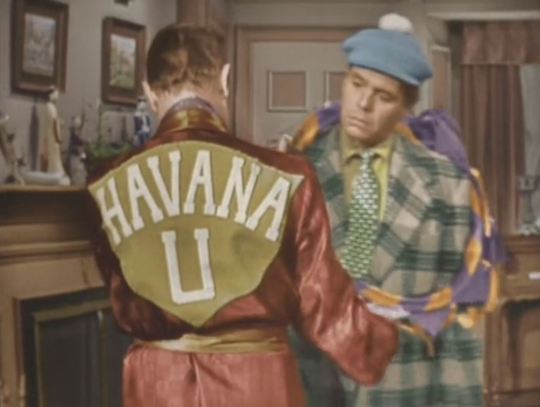
When Ricky (Hope) turns his back to the audience, his bathrobe says “Havana U” on it.

On “I Love Lucy” Ricky Ricardo claimed to have attended the University, and even sang their fight song in one episode.
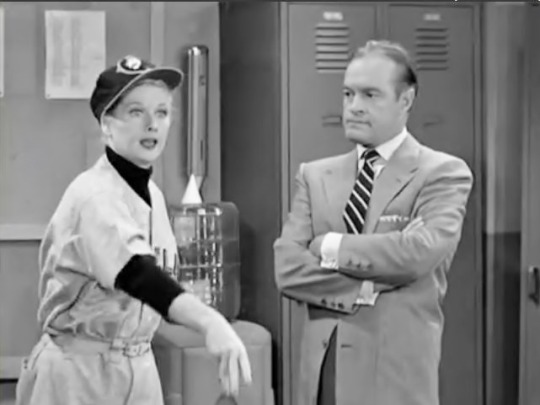
When Ricky can't understand Fred's thick Cuban accent, Bob Hope recycles a punchline he also used on “Lucy Meets Bob Hope” (ILL S6;E1) the week before: “You're trying to tell me something!”
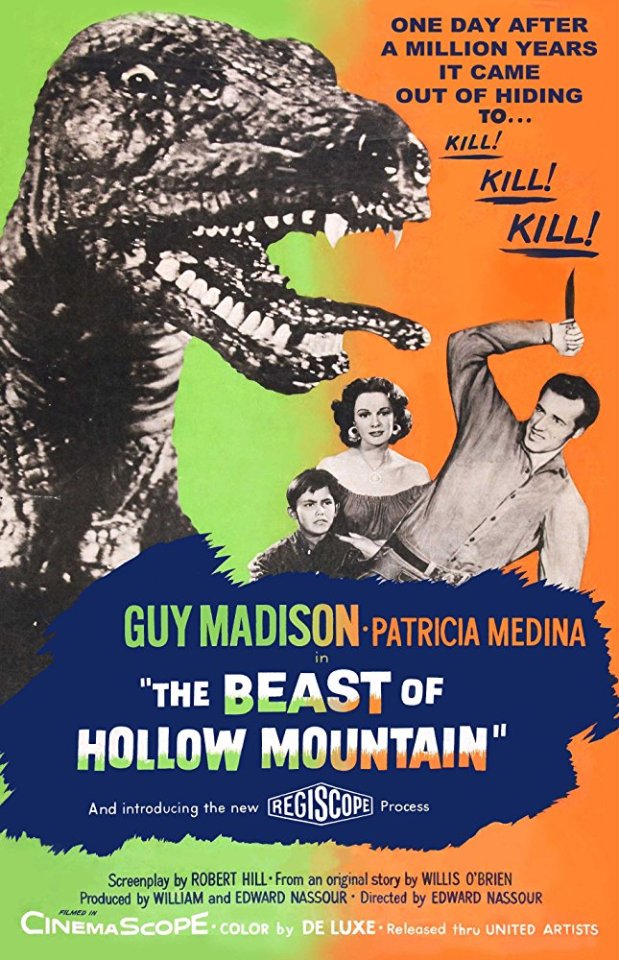
Lucy insists on playing charades. When Ricky complains he needs to go to bed, he asks Lucy “Who do you think I am?” As if a charade clue, she quickly replies “The Beast From Hollow Mountain”! This was the title of a low-budget horror flick about a modern-day dinosaur on the loose. The movie was released in August 1956.
When Lucy announces that Fred and Ethel's apartment is being fumigated (to hide that Captain Blystone is staying there), she says that the girls will sleep in the bedroom and the boys will take the living room. Hope breaks the fourth wall to address the audience:
Hope: “How do you like that? I marry Lucy and wind up with Desi.”
Both Ricky and Fred dive for the sofa at the same time. Hope is still straddling the fourth wall.
Hope (to Desi): “One chorus of 'Babalu' and out you go.”
Then Desi mutters under his breath “I should have never left CBS” which is likely an ad-lib by Arnaz.
When Ricky opens the closet door a huge circus ball rolls out. Lucy claims it is a beach ball for the little girl next door. When Ricky (Hope) tries to lift it, it is heavy, and he remarks “Who's the little girl? Sophie Tucker?”
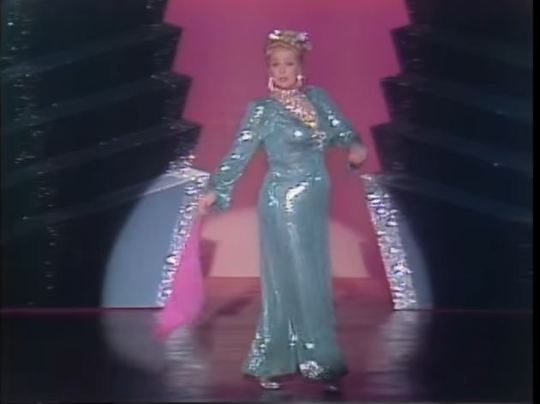
Sophie Tucker was a vaudeville personality of sturdy build. Lucille Ball would play Tucker on “Bob Hope's All-Star Comedy Salute to Vaudeville” in 1977.
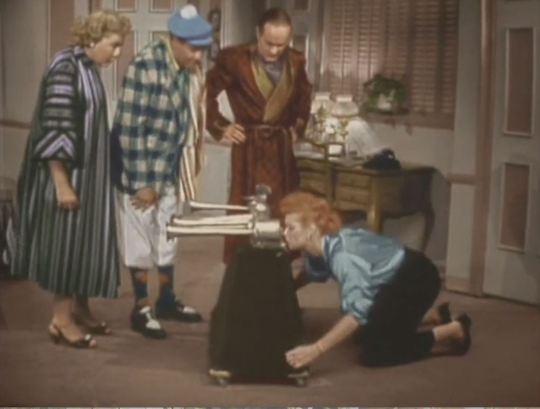
In another closet, Ricky finds what Lucy calls a ‘gramasousaxylophonovitch’, a series of horns arranged like a xylophone.
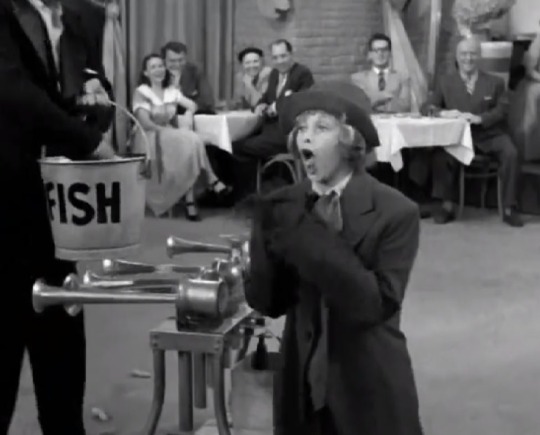
Five years earlier, on “The Audition” (ILL S1;E6), Lucy Ricardo pretended to be a trained seal and played "How Dry Am I" on the (what she called then) the ‘saxavibratronophonovitch’, but is virtually the same instrument. This was also part of the act Lucille Ball and Desi Arnaz toured live across the country to convince CBS and sponsors that their pairing would work on television.
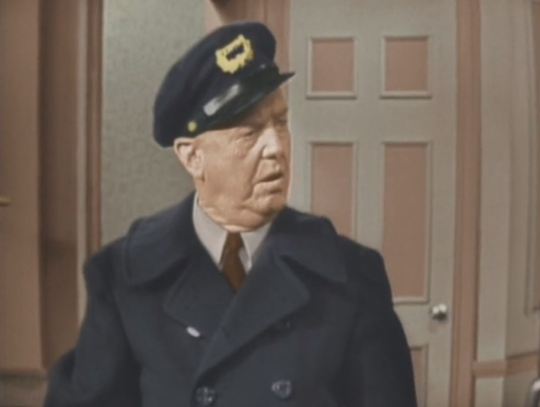
Lucy's performance wakes Captain Blystone (William Frawley) upstairs, who comes to claim his seal, who he calls Tommy. Lucy introduces the seal as her music teacher!
#The Bob Hope Show#The Bob Hope Chevy Show#Chevrolet#1956#NBC#I Love Lucy#Lucille Ball#Desi Arnaz#Vivian Vance#trained seal#Jimmy Cagney#Diana Dors#DebStars#Don Larsen#New York Yankees#Cleveland Indians#Marty#Somebody Up There Likes Me#$64000 Question#The Seven Little Foys#Mary's A Grand Old Name#Yankee Doodle Dandy#Trapeze#Man of a Thousand Faces#See the USA in a Chevrolet#Thanks for the Memory#The Walter Winchell Show#Caesar's Hour#Nanette Fabray#Elvis Presley
5 notes
·
View notes
Text
LUCY ON “THE CAROL BURNETT SHOW” ~ PART 3
November 24, 1969 ~ S3;E9
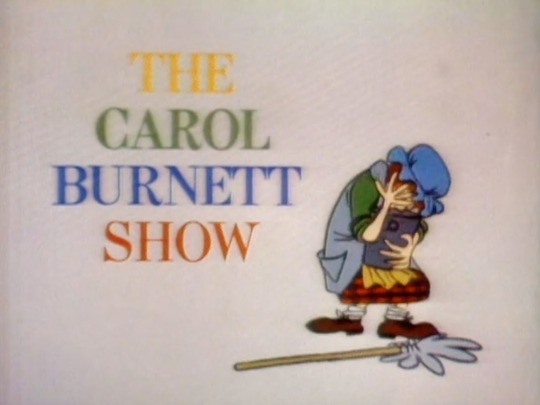
Directed by Dave Powers
Written by Bill Angelos, Stan Burns, Mike Marmer, Hal Goodman, Larry Klein, Don Hinkley, Kenny Solms, Gail Parent, Buz Kohan
Cast
Carol Burnett got her first big break on “The Paul Winchell Show” in 1955. A years later she was a regular on “The Garry Moore Show.” In 1959 she made her Broadway debut in Once Upon a Mattress, which she also appeared in on television three times. From 1960 to 1965 she did a number of TV specials, and often appeared with Julie Andrews. Her second Broadway musical was Fade Out – Fade In which ran for more than 270 performances. From 1967 to 1978 she hosted her own highly successful variety show, “The Carol Burnett Show.” Lucille Ball made several appearances on “The Carol Burnett Show.” Burnett guest starred in four episodes of “The Lucy Show” and three episodes of “Here’s Lucy,” subsequently playing a character named Carol Krausmeyer. After Lucille Ball’s passing, Burnett was hailed as the natural heir to Lucy’s title of ‘The Queen of TV Comedy.’
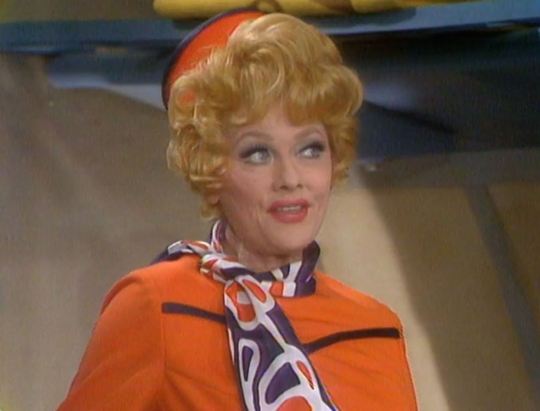
Lucille Ball was born on August 6, 1911 in Jamestown, New York. She began her screen career in 1933 and was known in Hollywood as ‘Queen of the B’s’ due to her many appearances in ‘B’ movies. With Richard Denning, she starred in a radio program titled “My Favorite Husband” which eventually led to the creation of “I Love Lucy,” a television situation comedy in which she co-starred with her real-life husband, Latin bandleader Desi Arnaz. The program was phenomenally successful, allowing the couple to purchase what was once RKO Studios, re-naming it Desilu. When the show ended in 1960 (in an hour-long format known as “The Lucy-Desi Comedy Hour”) so did Lucy and Desi’s marriage. In 1962, hoping to keep Desilu financially solvent, Lucy returned to the sitcom format with “The Lucy Show,” which lasted six seasons. She followed that with a similar sitcom “Here’s Lucy” co-starring with her real-life children, Lucie and Desi Jr., as well as Gale Gordon, who had joined the cast of “The Lucy Show” during season two. Before her death in 1989, Lucy made one more attempt at a sitcom with “Life With Lucy,” also with Gordon, which was not a success and was canceled after just 13 episodes.
Supporting Cast
Vicki Lawrence was born Vicki Ann Axelrad in Inglewood, California. She sent Carol Burnett a newspaper clipping showing their uncanny resemblance to her. Burnett called Vicki hoping to find an entertainer who could play her kid sister on her variety show. Lawrence was chosen as the kid sister and in the fall of 1967, she made her debut on the first episode of “The Carol Burnett Show.” She spent 11 years with the show and earned one Emmy Award and five more nominations. She created the role of Mama in the Family Sketches, which was spun off to “Mama's Family.” An accomplished singer, her recording of "The Night The Lights Went Out In Georgia" was number one and earned a Gold Record. Lawrence attended the tribute shows “All Star Party for Carol Burnett” in 1982 and “All Star Party for Lucille Ball” in 1984.
Harvey Korman got his first big break as a featured performer on “The Danny Kaye Show” in 1963. After ten successful seasons he left “The Carol Burnett Show” in 1977 to appear in his own series which only lasted six episodes. From 1964 to 1965 Korman appeared in three episodes of “The Lucy Show” as various characters. He found screen success in many of the films of Mel Brooks. Harvey Korman died in 2008 at age 81.
Lyle Waggoner was a handsome leading man who had little success in films but found fame as the announcer and character actor on “The Carol Burnett Show.” He left the show in 1974 in a mutual agreement with the producers to appear in “Wonder Woman.”
Guest Cast
George Carlin was a stand-up comic who specialized in skewering social topics. He is also noted for his masterful knowledge and use of the English language. Carlin's notorious "Seven Dirty Words" comedy routine was part of a radio censorship case that made its way to the Supreme Court in 1978. He made a second appearance on “The Carol Burnett Show” in 1978. Carlin died in 2008.

Sue Vogelsanger (Herself, in Audience and Archival Tape) was an audience member who wrote a song for Burnett. Her husband sits next to her.

Gary Morton (Himself, in Audience, uncredited) is Lucille Ball's second husband. He was a producer on “The Lucy Show” and “Here's Lucy” as well as doing a few on-camera roles. His laugh can be heard from the studio audience during the airline sketch.
Two uncredited extras play the parents in the Bob & Carol & Ted & Alice sketch and an uncredited actor plays the telegram delivery man in the vaudeville sketch.
Timeline of collaborations between Lucille Ball and Carol Burnett (not including award and talk shows)
September 27, 1960 - “The Garry Moore Show” (S3;E1) Lucille Ball, Guest
March 22, 1966 - “Carol + 2” Lucille Ball, Guest Star
October 31, 1966 - “Lucy Gets a Roommate” (TLS S5;E7) Carol Burnett as Carol Bradford
November 7, 1966 - “Lucy and Carol in Palm Springs” (TLS S5;E8) Carol Burnett as Carol Bradford
October 2, 1967 - “The Carol Burnett Show” (S1;E4) Lucille Ball, Guest Star
December 4, 1967 - “Lucy and Carol Burnett: Part 1” (TLS S6;E14) Carol Burnett as Carol Bradford
December 11, 1967 - “Lucy and Carol Burnett: Part 2” (TLS S6;E15) Carol Burnett as Carol Bradford
November 4, 1968 - “The Carol Burnett Show” (S2;E6) Lucille Ball, Guest
January 27, 1969 - “Lucy and Carol Burnett” (HL S1;E17) Carol Burnett as Herself
November 24, 1969 - “The Carol Burnett Show” (S3;E9) Lucille Ball, Guest
March 2, 1970 - “Lucy Competes With Carol Burnett” (HL S2;E24) Carol Burnett as Carol Krausmeyer
October 19, 1970 - “The Carol Burnett Show” (S4;E6) Lucille Ball, Guest
February 8, 1971 - “Lucy and Carol Burnett” (HL S3;E22) Carol Burnett as Carol Krausmeyer

A week after this episode first aired, the script for Carol's second appearance on “Here's Lucy” was finalized, although it would not air until March 2, 1970.

Like Lucille Ball’s sitcoms, “The Carol Burnett Show” also aired on Monday nights, generally at 10pm. Earlier that evening, “Here's Lucy” aired “Lucy, the Cement Worker” (HL S2;E10) guest-starring Paul Winchell.
In Carol's opening remarks she tells the audience about a recent Halloween at her home. She also tells the audience she was born in San Antonio, but raised in Hollywood since the age of seven.
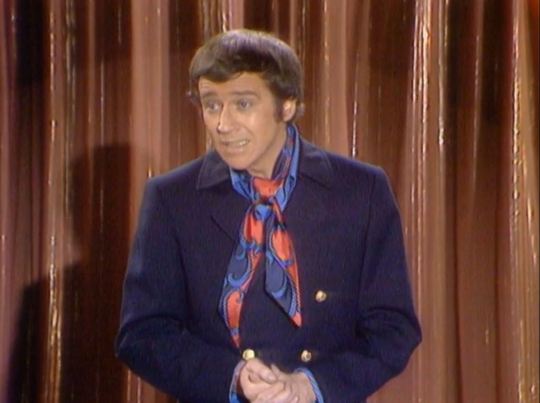
Carol introduces George Carlin, who does a stand-up routine criticizing the Emmy Awards' bias in favor of big-budget shows. He compares late night 'shows' like “Sermonette” and “The Star-Spangled Banner” to the likes of “The Ed Sullivan Show.” He imagines a big-budge version of “The FBI List of Most Wanted Men,” including a commercial for The Justice Department.
Carlin: “Remember for anti-trust or Commie bust, the Department that's just, is really a must! Don't leave your family defenseless. And now, heeeeeeeeere's J. Edgar!” ('Tonight Show' theme plays).
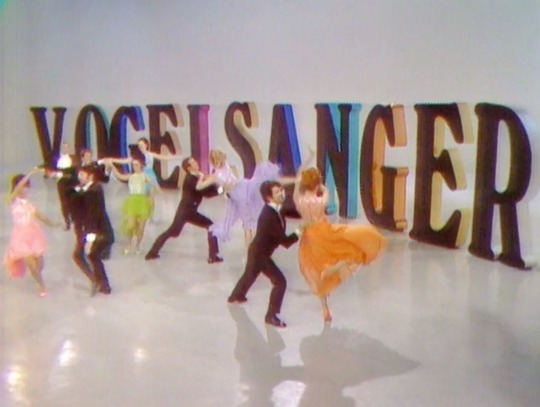
Carol sings a song written by audience member Sue Vogelsanger. It is titled “Just Talkin'.” Vogelsanger and her husband are in the audience.
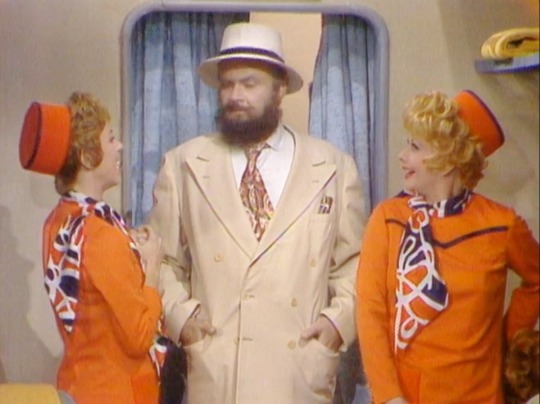
In Lucille Ball's first appearance on the show, two flight attendants Finster (Carol) and Agnes Hooper (Lucille Ball) compete for a best employee award from their employer, BWA. They encounter a mysterious passenger (Harvey Korman) with a Fidel Castro-like beard, cigars tucked in his breast pocket, and a Spanish accent.
Hooper: “Where are you from, sir? Havana?” Passenger: (alarmed) “Havana? What makes you think I'm from Havana?” Hooper: “Well, if it's one thing I know, it's a Cuban accent.”
This meta moment relies on the audience knowing that Lucille Ball was married to Desi Arnaz, a Cuban immigrant, as was his sitcom counterpart, Ricky Ricardo.
When the passenger pulls out a gun, Hooper and Finster fight over who will clean it for him. In the struggle, they inadvertently push him out the plane door, foiling his hijacking.

Lucy Carmichael and Carol Bradford trained as flight attendants in a two-part “The Lucy Show” in 1967.
Lyle and Vicki perform "Try a Little Kindness" by Curt Sapaugh and Bobby Austin, first recorded by Glen Campbell less than a month earlier.
The second half of the show opens with Carol in the shower singing “I Say A Little Prayer” written by Burt Bacharach and Hal David for Dionne Warwick in 1967. The song opens, however, with a verse of “Singin' in the Rain” by Arthur Freed and music by Nacio Herb Brown (1931). At the end of the song, Carol leaves the shower, and the camera reveals four soaking wet musicians in tuxedos inside.

Next is a spoof of Bob & Carol & Ted & Alice, a controversial 1969 film about two couples who end up in bed together. It was made into a short-lived TV series in 1973. Bob (originally Robert Culp) is played by Lyle Waggoner, Carol (originally Natalie Wood) is played by Carol Burnett, Ted (originally Elliott Gould) is played by Harvey Korman, and Alice (originally Dyan Cannon) is played by Lucille Ball.
Ted: “I'm afraid the neighbors will talk.” Alice: “No, they won't.” Carol: “Why not?” Alice: “We're the neighbors.”

In the final sketch, Harvey Korman plays Tommy Two Step, the emcee at an old vaudeville theatre in 1919. Onstage, he introduces Polly (Carol) and Dolly (Lucy), the Rock Sisters.

They sing “Happiness Cocktail” while strumming ukuleles. Dolly then breaks out a saxophone, and Polly a coronet. Although Lucille Ball had a basic knowledge of both saxophone and ukulele (and demonstrated it on her sitcoms), she is pantomiming to the offstage orchestra, as is Carol. Lyle Waggoner plays the theatre manager who fires the act.

Fast forward to 1969, where fast-talking disc jockey Big Daddy (George Carlin) desperately needs one more act for a big 100-group rock concert. His dim-witted girlfriend / groupie Tondalayo (Vicki Lawrence) hires the Rock Sisters by telegram, based on their name alone.

Polly: “Our gowns! Where are our gowns?” Dolly: “I took them to the cleaners.” Polly: “Do you think they're ready?” Dolly: “They should be. I took them in 1931.”

Oops! During the airline sketch, during a more serious moment with Carol and Harvey, Lucy starts to smile, about to break character, but quickly regains her composure.
When Lucy catches Harvey's spat-out cigar in mid-air, Korman gives her a long, admiring glance as if to say “Well done!” Gary Morton's laugh from the audience can be heard during this moment.
When Korman's character loudly announces he's got a gun and is hijacking the plane to Cuba, the other passengers (background actors) don't react at all!
This Date in Lucy History - November 24th

"Redecorating" (ILL S2;E8) – November 24, 1952
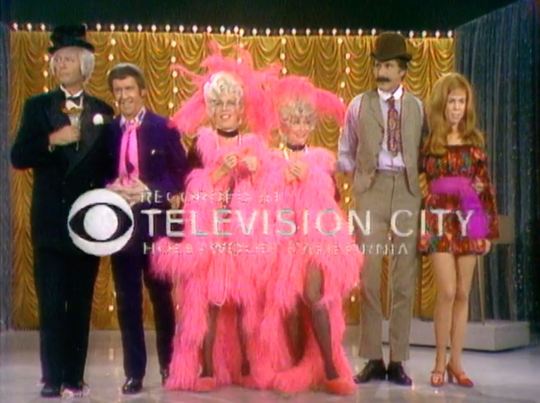
#The Carol Burnett Show#Carol Bunett#Lucille Ball#Lucy#George Carlin#Harvey Korman#Vicki Lawrence#Lyle Waggoner#Dave Powers#1969#Sue Vogelsanger#Gary Morton#Bob & Carol & Ted & Alice#vaudeville#Say a little prayer#Try a little kindness#cbs#tv
1 note
·
View note
Text
CAROL + 2
March 22, 1966

Directed by Marc Breaux
Written by Nat Hiken and Charles Sherman
CAST

Carol Burnett (Herself) got her first big break on “The Paul Winchell Show” in 1955. A years later she was a regular on “The Garry Moore Show.” In 1959 she made her Broadway debut in Once Upon a Mattress, which she also appeared in on television three times. From 1960 to 1965 she did a number of TV specials, and often appeared with Julie Andrews. Her second Broadway musical was Fade Out – Fade In which ran for more than 270 performances. From 1967 to 1978 she hosted her own highly successful variety show, “The Carol Burnett Show.” Lucille Ball made several appearances on “The Carol Burnett Show.” Burnett guest starred in four episodes of “The Lucy Show” and three episodes of “Here’s Lucy,” subsequently playing a character named Carol Krausmeyer. After Lucille Ball’s passing, Burnett was hailed as the natural heir to Lucy’s title of ‘The Queen of TV Comedy.’

Lucille Ball (Herself) was born on August 6, 1911 in Jamestown, New York. She began her screen career in 1933 and was known in Hollywood as ‘Queen of the B’s’ due to her many appearances in ‘B’ movies. With Richard Denning, she starred in a radio program titled “My Favorite Husband” which eventually led to the creation of “I Love Lucy,” a television situation comedy in which she co-starred with her real-life husband, Latin bandleader Desi Arnaz. The program was phenomenally successful, allowing the couple to purchase what was once RKO Studios, re-naming it Desilu. When the show ended in 1960 (in an hour-long format known as “The Lucy-Desi Comedy Hour”) so did Lucy and Desi’s marriage. In 1962, hoping to keep Desilu financially solvent, Lucy returned to the sitcom format with “The Lucy Show,” which lasted six seasons. She followed that with a similar sitcom “Here’s Lucy” co-starring with her real-life children, Lucie and Desi Jr., as well as Gale Gordon, who had joined the cast of “The Lucy Show” during season two. Before her death in 1989, Lucy made one more attempt at a sitcom with “Life With Lucy,” also with Gordon, which was not a success and was canceled after just 13 episodes.

Zero Mostel (Himself) was an actor, singer and comedian of stage and screen, best known for his portrayal of comic characters such as Tevye on stage in Fiddler on the Roof, Pseudolus on stage and on screen in A Funny Thing Happened on the Way to the Forum, and Max Bialystock in the original film version of The Producers. He won three Tony Awards for his Broadway appearances. His film debut was alongside Lucille Ball in 1943's Du Barry Was a Lady. He died in 1977 at age 62.
John Harlan (Announcer)

This is the second of a multi-year series of television variety specials starring Carol Burnett. The first special was aired in 1962, featuring Burnett and Julie Andrews “Julie and Carol at Carnegie Hall.”

The special was sponsored by American Motors Corporation (AMC) which was formed in 1954 by the merger of Nash-Kelvinator and Hudson Motor Car. At the time, it was the largest corporate merger in US history. After periods of intermittent but unsustained success, the company was ultimately acquired by Chrysler and ceased operation in 1988. The first commercial in the hour-long program stars Sid Melton, who had appeared in three episodes of “The Lucy-Desi Comedy Hour.” Although the AMC commercials are not included on the DVD release, some of the kinescope prints still retain the filmed commercials. The DVD does include, however, Carol Burnett's intro to two of the commercials.

The inclusion of Lucille Ball was partly because CBS insisted on Burnett having an established co-star for the special, and also because Ball already had a contract with CBS for up to three specials (in addition to “The Lucy Show”) for the 1966-67 season, of which she would only produce one, “Lucy in London.”
The show was such a critical and ratings success that CBS rebroadcast it on January 15, 1967. It was released on DVD on May 17, 2016. In April 2016, MeTV broadcast the special for the first time in 50 years.
The original airing straddled TV's transition from black and white to color. While “Carol + 2” was shot and aired in color, kinescope prints exist in black and white as well. While “The Lucy Show” was shot in color from Fall 1963, it wasn't aired in color by CBS until fall 1965.

The day before this special aired, “Lucy, the Superwoman” (TLS S4;E26) was broadcast for the first time.

Lucille Ball and Carol Burnett first shared the small screen in 1960 on “The Gary Moore Show,” where Carol was a regular and Lucy a guest. In 1966 and 1967 Burnett guest-starred in two two-part episodes of “The Lucy Show.” Both appearances were as Carol Bradford, who was at first Lucy's Los Angeles roommate. In their second teaming the two attended flight attendant school together. In 1969 Burnett played herself on “Here's Lucy,” and in 1970 she played another Carol, Carol Krausemeyer, a fellow secretary competing in a beauty contest with Lucy. In return, Lucille Ball guest-starred on “The Carol Burnett Show” during one episode of each of her first four seasons.

Coincidentally, Lucy, Carol and Zero all played Broadway's Alvin (now Neil Simon) Theatre in new musicals: Carol in Once Upon a Mattress (1960), Lucy in Wildcat (1961), and Zero in A Funny Thing Happened on the Way to the Forum (1962). Lucy and Zero were on Broadway at the same time in 1961; she with Wildcat, he with Rhinoceros. Carol and Zero were on Broadway at the same time in 1964; she in Fade Out – Fade In, and he in Fiddler on the Roof. Burnett's understudy in Fade Out – Fade In was Mitzi Welch, who wrote music for “The Carol Burnett Show” and the song “You're My Reason” for this special.

“Carol + 2” is also available as a bonus feature on the Time Life box set “Carol Burnett’s Lost Episodes.” It is also available on a stand-alone DVD release by Time Life. Interestingly, Zero Mostel is not mentioned or pictured on the cover, which is subtitled “The Original Queens of Comedy.”

In the opening, Carol introduces Lucy and Zero, who laments that TV show chatter is so artificial.
Carol: “I would like to present a woman who has dazzled the world with her charm and talent, who has conquered every phase of show business, who is the first lady of television, and who wrote this introduction.”

After a commercial, Lucy comes out and starts to play “Swanee River” on the banjo, but is interrupted by Carol. A running gag throughout the special is Mostel or Lucy wanting to do a solo act, but being interrupted. Lucille Ball had a rudimentary knowledge of several musical instruments, but banjo was not one of them. She was miming to a pre-recorded track.

Two years later, she would once again mime playing the banjo, this time with her daughter Lucie and Wayne Newton on a 1968 episode of “Here's Lucy.”

In the first sketch, "10th Anniversary," Carol and Zero play a bitter couple named Florence and Fielding Kissel who suddenly find out their marriage license is invalid. Whatever Florence says to him, he says “Shut up!” Whatever Fielding says to her, she snaps “Drop dead!”

After discovering that they're single again, they find themselves madly attracted to one another, but when a second phone call says it was all a mistake, they revert to being miserable marrieds again.
During the sketch Mostel croons a bit of "You and the Night and the Music" by Arthur Schwartz and Howard Dietz. The song debuted in the Broadway show Revenge with Music in 1934. He then launches into a bar of “The Night Was Made For Love” by Otto Harbach and Jerome Kern, written in 1931 for the Broadway musical The Cat and the Fiddle. Finally, Mostel sings a verse of “Some Enchanted Evening,” written by Rodgers and Hammerstein for their 1949 Broadway musical South Pacific.

After a commercial, the same characters return, but in a different mood. Florence is found gazing at her wedding photograph and sings the ballad “You're My Reason” by Mitzi Welch, while Fielding sleeps on the sofa. Welch composed all the special material for “The Carol Burnett Show.” At the end of the song Fielding wakes up and quietly says “Shut up” and she lovingly says “Drop dead” as the scene fades.
After a commercial break, Zero Mostel sits at a grand piano and starts ad libbing a song with the odd lyrics “Millard Fillmore is dead and nobody came to the funeral.” Carol interrupts him and the scene transitions to the next sketch.

In the sketch “Goodbye Baby,” Alice (Carol) is saying goodbye to her sister Rita (Lucy) at a bus stop. Rita is about to leave on a two-week vacation to Miami but Alice won't let her sister leave without first hearing her infant baby say goodbye to his aunt. Alice's insistence and Rita frustration about missing her bus brings out the hidden animosity between the two sisters.

Alice: (shouting) “Jack the Ripper! John Dillinger! Machine Gun Kelly!” Rita: “How did they get into this?” Alice: “Oh, they're just some of the others who were rejected by their aunts when they were eight months old.”

Lucy's Brooklyn accent starts off strong, but then quickly fades out completely.

Zero takes the stage and starts to sing “The Road to Mandalay”, a song by Oley Speaks based on the poem by Rudyard Kipling. It was made famous by Frank Sinatra in 1958. Instead, Lucy and Carol slyly convince him to sing “If I Were A Rich Man,” a song he introduced in the 1964 Broadway musical Fiddler on the Roof by Jerry Bock and Sheldon Harnick. Although Mostel had left the cast of the musical by this time, the original cast album was still very popular.

In the sketch "What's Wrong with My Brother," Miss Cleaver (Carol) confides to her psychiatrist (Zero), that her brother thinks he's a frog.

To Miss Cleaver’s chagrin, the psychiatrist seems more concerned about the symbolism behind her scratching her itchy nose, which causes her to go to great (comic) lengths to avoid doing so.
Once again, Lucy comes out and starts to play “Swanee River” on the banjo, but this time she is interrupted by Zero.

In the sketch “Bunny Club,” Carol plays Nellie, the wardrobe mistress at the Bunny Club. Zero plays Eddie, the club's bartender who Nellie is sweet on. After he abruptly leaves, she dejectedly sings a slow-tempo version of "Wait 'Till the Sun Shines Nellie" by Harry Von Tilzer and Andrew B. Sterling (1905).

For much of the song, Carol sings to her own reflection in a mirror. In the brief dialogue set-up, the word “Playboy” is never spoken, although clearly that is the inference.
Zero takes the stage alone in a spotlight to lush orchestral music and starts to sing in Italian. Naturally he is interrupted – this time by both Carol and Lucy.

In the final sketch, Carol and Lucy play Evelyn and Emily, cleaning ladies who work nights at a New York City Talent Agency. The pair vicariously live the lives of show business producers. The establishing shot of the front door tells us that it is the William Morris Talent Agency on the 34th floor of a skyscraper. The two charwomen are arguing over whether 'they' can afford Cary Grant for an upcoming picture.

Emily: “They expect to make this picture for three million. They're shooting in Panavision. They've got a six week shooting schedule. Two weeks on location in Utah. If they bring this picture in for a penny less than five million four then I know nothing about show business!”
Evelyn says they're trying to talk Warner Brothers into making Joan of Arc with Jayne Mansfield.

Emily: “Jayne Mansfield as Joan of Arc! Man, would she take long to burn!”
Evelyn wonders if Cary Grant could do the picture if they offered him a capital gains deal like Emily came up with for Marlon Brando in Mutiny on the Bounty.

Evelyn: “It's a lucky thing we work at night. If anyone here ever heard us talking about our big deals they'd drop a net on us and cart us away to the palace for peculiars.”

There is a photograph of Vivian Vance hanging on the wall of the office. Vance made her last regular appearance on “The Lucy Show” in April 1965 in order to spend more time at home on the East Coast, although she would return for two guest appearances in 1967 and 1968. Vance did no acting at all in 1966, only making two quiz show appearances as herself.
Emily: “Are you still going around with that doorman from the Paramount?” Evelyn: “Ralph and I are engaged.” Emily: “Oh, brother!” Evelyn: “I know you don't approve of him.” Emily: “It's not him, Evelyn. But you know how I feel about show business marriages. Just don't come crying to me when your careers clash.”

Both Lucille Ball and Carol Burnett were in show business marriages that failed: Lucy to musician Desi Arnaz and Carol to producer Joe Hamilton. The Hamiltons divorced in 1984 and the Arnazes in 1960. This show was also written in the days when cinemas like the Paramount had uniformed doormen to admit patrons.

The sketch ends with the two charwomen doing a rousing song and dance number called “Chutzpah!”

Carol ends the show by calling out Zero and Lucy for a bow. Lucy and Carol are dressed in bright pink, an indication that color television was trying to make an impression. After a brief spot recognizing sponsor AMC, the trio sing “Bye Bye.”
The DVD has a quick outtake of Carol saying goodnight to the studio audience asking them to watch when the show airs to “up the ratings.”
This Date in Lucy History – March 22

"Ricky's Hawaiian Vacation" (ILL S3;E22) – March 22, 1954

"Lucy and the Beauty Doctor" (TLS S3;E24) – March 22, 1965
#Carol + 2#Carol + Two#Carol Plus 2#Carol Plus Two#Carol Burnett#Lucille Ball#Lucy#1966#Zero Mostel#Fiddler on the Roof#If I Were A Rich Man#Marc Breaux#Nat Hiken#Charles Sherman#Alvin Theatre#John Harlan#Sid Melton#AMC#American Motors Corporation#CBS#Swanee River#The Road to Mandalay#You and the Night and the Music#Some Enchanted Evening#The Night Was Made for Love#Mitzi Welch#Wait Till The Sun Shines Nellie#Jayne Mansfield#William Morris#Charwoman
1 note
·
View note
Text
SAFE DRIVING WEEK
October 21, 1950
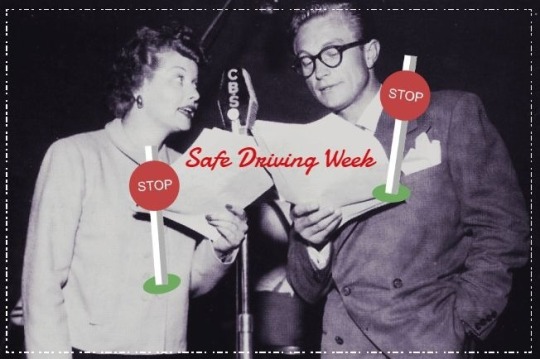
“Safe Driving Week” (aka “Safety Drive”) is episode #102 [some sources say #101] of the radio series MY FAVORITE HUSBAND broadcast on October 21, 1950.
This was the sixth episode of the third season of MY FAVORITE HUSBAND. There were 31 new episodes, with the season ending on March 31, 1951.
Synopsis ~ When Liz gets a traffic ticket on the day George is Safety Week chairman, George decides to lock the car in the garage and hide the key.
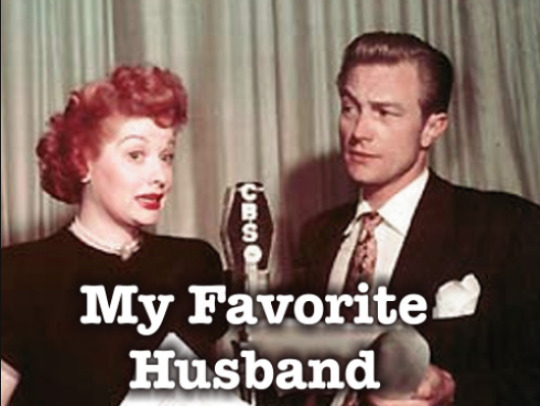
“My Favorite Husband” was based on the novels Mr. and Mrs. Cugat, the Record of a Happy Marriage (1940) and Outside Eden (1945) by Isabel Scott Rorick, which had previously been adapted into the film Are Husbands Necessary? (1942). “My Favorite Husband” was first broadcast as a one-time special on July 5, 1948. Lucille Ball and Lee Bowman played the characters of Liz and George Cugat, and a positive response to this broadcast convinced CBS to launch “My Favorite Husband” as a series. Bowman was not available Richard Denning was cast as George. On January 7, 1949, confusion with bandleader Xavier Cugat prompted a name change to Cooper. On this same episode Jell-O became its sponsor. A total of 124 episodes of the program aired from July 23, 1948 through March 31, 1951. After about ten episodes had been written, writers Fox and Davenport departed and three new writers took over – Bob Carroll, Jr., Madelyn Pugh, and head writer/producer Jess Oppenheimer. In March 1949 Gale Gordon took over the existing role of George’s boss, Rudolph Atterbury, and Bea Benaderet was added as his wife, Iris. CBS brought “My Favorite Husband” to television in 1953, starring Joan Caulfield and Barry Nelson as Liz and George Cooper. The television version ran two-and-a-half seasons, from September 1953 through December 1955, running concurrently with “I Love Lucy.” It was produced live at CBS Television City for most of its run, until switching to film for a truncated third season filmed (ironically) at Desilu and recasting Liz Cooper with Vanessa Brown.
MAIN CAST
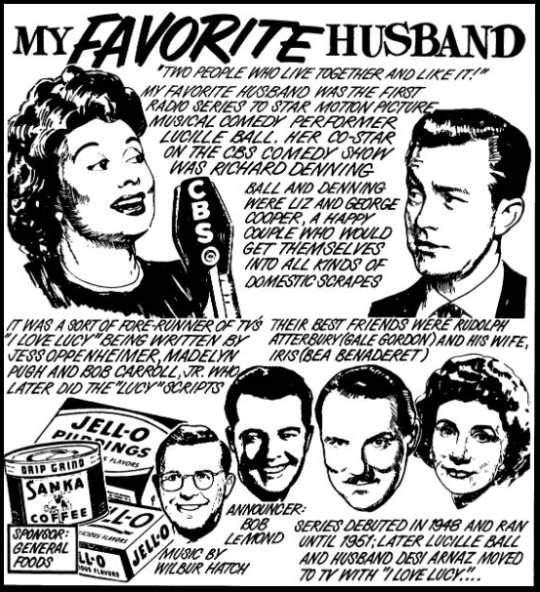
Lucille Ball (Liz Cooper) was born on August 6, 1911 in Jamestown, New York. She began her screen career in 1933 and was known in Hollywood as ‘Queen of the B’s’ due to her many appearances in ‘B’ movies. With Richard Denning, she starred in a radio program titled “My Favorite Husband” which eventually led to the creation of “I Love Lucy,” a television situation comedy in which she co-starred with her real-life husband, Latin bandleader Desi Arnaz. The program was phenomenally successful, allowing the couple to purchase what was once RKO Studios, re-naming it Desilu. When the show ended in 1960 (in an hour-long format known as “The Lucy-Desi Comedy Hour”) so did Lucy and Desi’s marriage. In 1962, hoping to keep Desilu financially solvent, Lucy returned to the sitcom format with “The Lucy Show,” which lasted six seasons. She followed that with a similar sitcom “Here’s Lucy” co-starring with her real-life children, Lucie and Desi Jr., as well as Gale Gordon, who had joined the cast of “The Lucy Show” during season two. Before her death in 1989, Lucy made one more attempt at a sitcom with “Life With Lucy,” also with Gordon.
Richard Denning (George Cooper) was born Louis Albert Heindrich Denninger Jr., in Poughkeepsie, New York. When he was 18 months old, his family moved to Los Angeles. Plans called for him to take over his father’s garment manufacturing business, but he developed an interest in acting. Denning enlisted in the US Navy during World War II. He is best known for his roles in various science fiction and horror films of the 1950s. Although he teamed with Lucille Ball on radio in “My Favorite Husband,” the two never acted together on screen. While “I Love Lucy” was on the air, he was seen on another CBS TV series, “Mr. & Mrs. North.” From 1968 to 1980 he played the Governor on “Hawaii 5-0″, his final role. He died in 1998 at age 84.
Ruth Perrott (Katie, the Maid) was also later seen on “I Love Lucy.” She first played Mrs. Pomerantz, a member of the surprise investigating committee for the Society Matrons League in “Pioneer Women” (ILL S1;E25), as one of the member of the Wednesday Afternoon Fine Arts League in “Lucy and Ethel Buy the Same Dress” (ILL S3;E3), and also played a nurse when “Lucy Goes to the Hospital” (ILL S2;E16). She died in 1996 at the age of 96.
Bob LeMond (Announcer) also served as the announcer for the pilot episode of “I Love Lucy”. When the long-lost pilot was finally discovered in 1990, a few moments of the opening narration were damaged and lost, so LeMond – fifty years later – recreated the narration for the CBS special and subsequent DVD release.
Gale Gordon and Bea Benadaret (Rudolph and Iris Atterbury) do not appear in this episode.
GUEST CAST
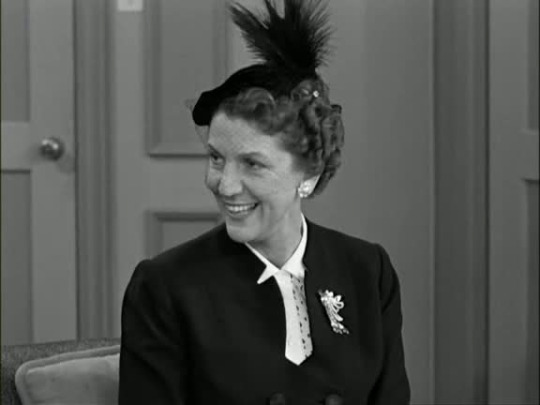
Elvia Allman (Marge Van Tassle) was born on September 19, 1904 in Enochville, North Carolina. She started her performing career on radio in the 1920s, as both a storyteller and singer. Allman’s first episode of “I Love Lucy” is also one of the most memorable in TV history: “Job Switching” (ILL S2;E1) in September 1952. She played the strident foreman of Kramer’s Candy Kitchen. Allman returned to the show as one of Minnie Finch’s neighbors in “Fan Magazine Interview” (ILL S3;E17) in 1954. Changing gears once again she played prim magazine reporter Nancy Graham in “The Homecoming” (ILL S5;E6) in 1955. She made two appearances on “The Lucy–Desi Comedy Hour“ - first as Ida Thompson, Westfield’s PTA director in “The Celebrity Next Door” (LDCH S1;E2) and as Milton Berle’s secretary when “Milton Berle Hides Out at the Ricardos” (LDCH S3;E1) in 1959. On “The Lucy Show” she was seen in “Lucy Bags a Bargain” (TLS S4;E17) and in “Lucy The Babysitter” (TLS S5;E16). Allman died on March 6, 1992, aged 87.
Lucy characters have always had a peripheral character named Marge. In this case, the character largely takes on the action that might normally be taken by Iris Atterbury. It is likely that Bea Benadaret was not available that week, so the character was rewritten for Elvia Allman as Marge Van Tassle.
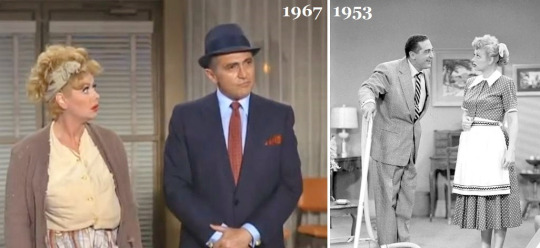
Sheldon Leonard (Motorcyle Cop) was born Leonard Sheldon Bershad in New York City in 1907. In 1953 he played fast-talking salesman Harry Martin, who sells Lucy Ricardo the Handy Dandy vacuum cleaner in “Sales Resistance” (ILL S2;E17). He played himself on a 1967 episode of “The Lucy Show.” Leonard was an integral part of the Desilu family off-screen as well, directing “Make Room for Daddy” including an episode that featured Lucy and Ricky Ricardo in 1959. He was one of the creators of “The Andy Griffith Show,” also filmed at Desilu. Leonard may be best remembered as the Nick, the bartender in the classic film It’s a Wonderful Life (1945). He died in 1997.
THE EPISODE
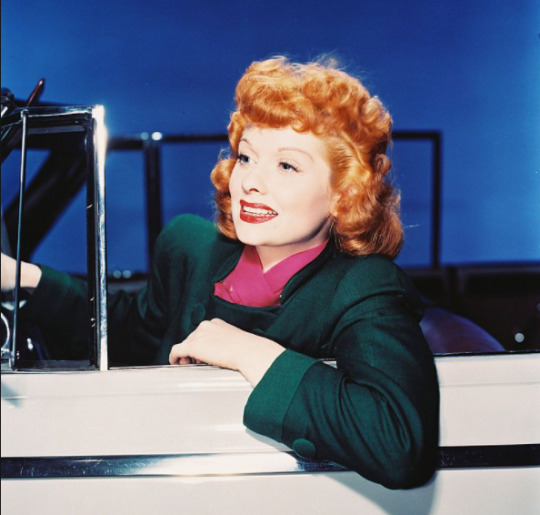
ANNOUNCER: “As we look in on the town of Sheridan Falls, where the Coopers live, it's an average Wednesday morning. The traffic on Elm Street is fairly heavy, the cars are moving along about as usual, except - wait a minute! Pull over to the curb! Here comes a woman driver! It's Liz Cooper driving!”
Liz is pulled over by a policeman (Sheldon Leonard), although she’s unclear why. He says that Liz made the wrong arm signal when turning left.

Turn signal lights in cars didn’t become common until later in the 1950s. Before that, letting everyone know which way one planned to turn was by using the hand signals above, which were taught in driving classes.
When Liz asks what he is writing, he facetiously calls it a story for Reader’s Digest about ‘The Most Unforgettable Person I’ve Ever Met’! Naturally, it is a traffic ticket.
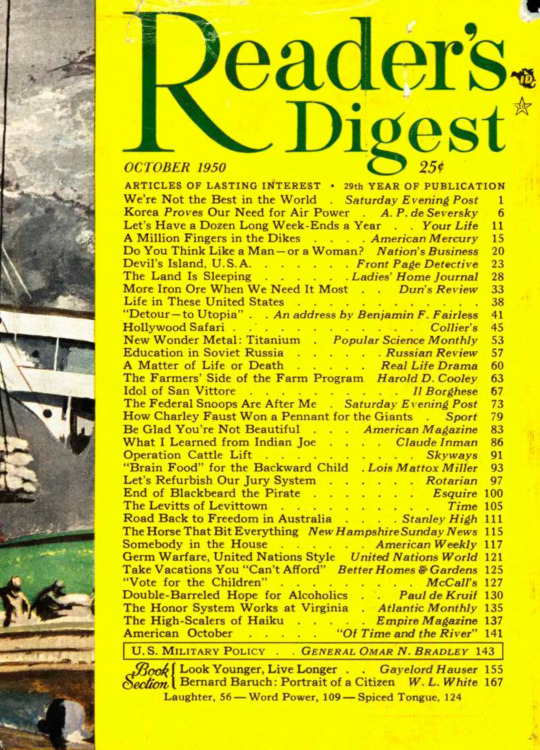
Reader’s Digest was known for their publication of abridged novels, short stories, and articles that could be read in one sitting. Ricky was seen reading the Digest in “Lucy Writes a Novel” in 1954. That same year, a biography of Ball by Eleanor Harris was included in the Digest - condensed, naturally. Ball appeared on the covers in 1990 and 2003. “My Most Unforgettable Character” was a regular feature, along with “Life in These United States.”
Arriving home Liz is greeted by Katie the maid, who encourages her to face George and tell him about the ticket. After a kiss, George has big news, but so does Liz. She allows him to go first. He has been chosen as Chairman of Sheridan Falls Safe Driving week by the Chamber of Commerce. Liz now cannot possibly tell George about the ticket!
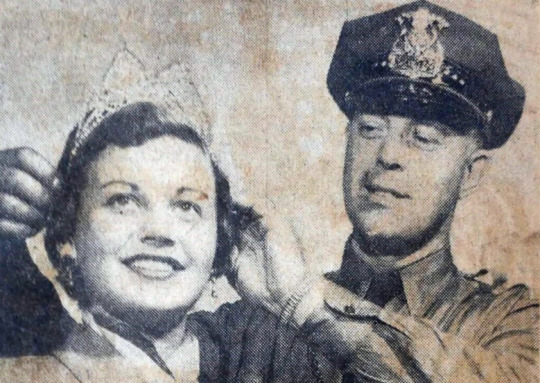
Safe Driving campaigns were not unusual in post-war America. Roads were seeing increased traffic as automakers vied for consumer dollars. For example, Cynthia Gary was crowned Queen of Safe Driving and reigned over the 1950 Safe Driving Week campaign sponsored by the St. Paul Junior Chamber of Commerce.
The doorbell rings. Liz is saved by the bell! While Liz is answering the door, Katie spills the beans about the citation to George! George tells her that he knows about her ticket. He tells her about the Safety Week celebrations.
GEORGE: “They’re having a big ceremony at the site of the new automobile club. There’s going to be a parade of all the drivers in town who haven’t gotten a ticket in ten years.” LIZ: “Well, that’ll be a short parade.”
To keep Liz from getting any more tickets during his Safety Week, he takes her up on her off-handed suggestion to lock the car in the garage for the week. George will have the key to the garage in his pocket. Liz will have to walk!
GEORGE: “I’ll take you to a movie after dinner. There’s a movie that reminds me of your driving: ‘Panic in the Streets’!”

Panic in the Streets is a 1950 film noir directed by Elia Kazan. It was shot exclusively on location in New Orleans, Louisiana. It starred Richard Widmark ("The Tour”), Zero Mostel (DuBarry Was A Lady and "Carol +2″), and Paul Douglas (”Lucy Wants A Career”). The film was released a month before this broadcast.
At the end of the week, Liz is visited by Marge Van Tassel (Elvia Allman). Liz has a plan and needs her help. She has had mishap and lost the front fender to an anonymous accident. Naturally, she doesn’t want George to find out.
LIZ: “Somewhere in this town there’s a car with five fenders.”
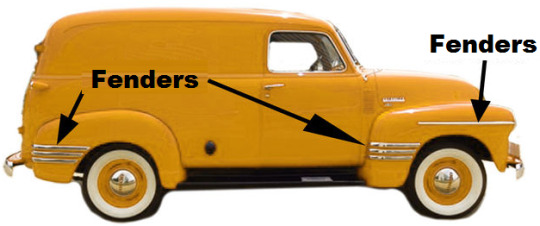
Note: A fender is different than a bumper because it's a metal structure that frames the wheel well of your car, instead of the front or back. The fender extends between the front door to the front bumper covering the front wheels of the vehicle.
Without the key, Liz and Marge plot to take the drastic action of taking the garage door off!
LIZ: “I guess it’s either take down the garage door or start hunting for a very thin, flat mechanic.”

In the act break, there is a public service announcement to debunk the misconception that the US finances most of the cost of the mutual defense program of NATO.
ANNOUNCER: “As we look in on the Coopers once again we find Liz and Marge Van Tassel in the backyard, gently removing the garage door.”
There is a great splintering of wood as Marge and Liz finally gain access to the car. Unfortunately, they don’t have the car key! Looking for a way to start the car without the key, they look under the hood.
LIZ: “Hmmmm... It’s a motor alright!”
Liz toys with the idea of pulling out the plugs leading to the spark plugs. Marge thinks the fan belt is a little propeller. Liz insists it is an electric fan to keep the mechanic cool. Somehow, Liz connects two wires and the car starts! Leaving the garage, she backs over the doors!

In “The Not So Popular Mechanics” (HL S5;E22) in 1972, Lucy Carter and Mary Jane take apart Harry’s prized Rolls Royce thinking it will be easy to give it a home oil change! They end up with a puzzle they cannot put back together!
Once pn the street, Liz realizes she can’t turn! The steering wheel is locked! It isn’t long before they have a hit and run accident and lose another fender! The collision at least knocks the car at an angle. But the wrong angle. They are facing the opposite direction of the repair shop!
LIZ: “Well, we have a choice, Marge. We can back-up ten blocks or drive around the world!” MARGE: “I’ve seen you back-up. It’d be quicker to drive around the world!” LIZ: “I just hope there’s a good mechanic in Hong Kong!”
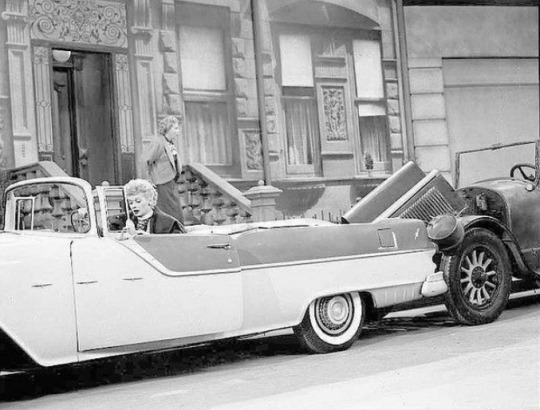
When “Lucy Learns To Drive” (ILL S4;E12) in 1955, she also has a traffic accident - with herself!
It isn’t long before Liz comes face to face with another car, who passes them on the wrong side because she’s three feet from the left curb! A policeman pulls them over - the same officer who issued Liz the ticket. To explain her driving on the left, Liz decides to adopt a British accent.
LIZ: “Pip-pip, cheerio, hallo there, Bobbie!”

Lucy will use her British accent when “I Love Lucy” visits London and the British countryside in early 1956. British policeman are known as Bobbies after Sir Robert Peel (1778-1850), who helped establish their modern police force.
The Officer tests her by asking her to sing the British Anthem. Marge and Liz sing “London Bridge is Falling Down.”
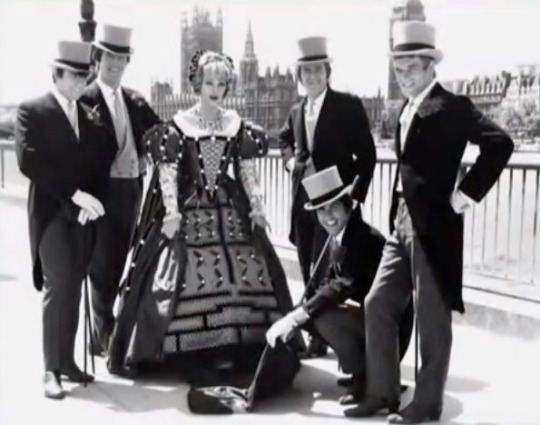
In “Lucy in London” (1966), The Dave Clark Five perform a medley of “London Bridge is Falling Down” and “Pop Goes the Weasel, instead of the real anthem, “God Save the Queen”. The London Bridge seen in the special is the old London Bridge (1831-1967). A year after filming, this bridge was dismantled and sold while a new version (that still stands today) was built to replace it. The old London Bridge was reassembled in Lake Havasu City, Arizona, opening in 1971, where it remains the number one tourist attraction.
The policeman insists on driving the car away from the curb, but runs over his own motorcycle in the process!
Marge and Liz drive away, leaving the motorcycle cop in tears, clutching only his handlebars.

Fred Mertz backs wrecks his motorcycle when “Ricky Sells The Car” (ILL S5;E4) in 1955. He, too, is left clutching only the handlebars!
Marge and Liz notice that the traffic has gotten slower and heavier and that spectators are crowded on the sidewalks. They are in George’s Safety Week Parade for drivers with no tickets in the last ten years! Rather than let George Liz stops suddenly and causes a multi-car collision.
LIZ: “I see a wreck.” MARGE: “Just one?” LIZ: “Yep. Just one. But it’s three blocks long. There are very few drivers left in this town who haven’t had an accident in the last ten years.”
George comes down from the reviewing stand and angrily insists that he will move the car himself - despite Liz’s attempted warnings not to...

#My Favorite Husband#Safety Week#Lucille Ball#Elvia Allman#Bob LeMond#Ruth Perrott#Richard Denning#I Love Lucy#Vivian Vance#William Frawley#Motorcycle#Lucy in London#London Bridge#Here's Lucy#Mary Jane Croft#NATO#1950#Panic in the Streets#Readers Digest#Sheldon Leonard
0 notes
Text
WOMEN’S CLUB ELECTION
September 30, 1949
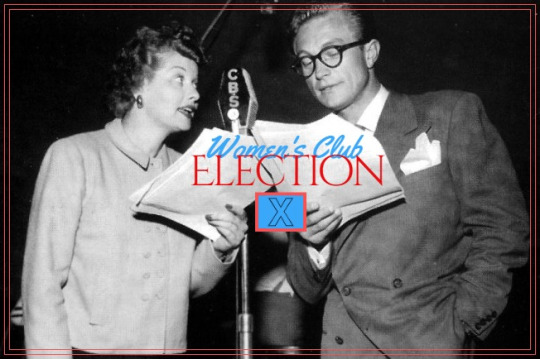
"Women’s Club Election” (aka “Liz Is Elected Women’s Club Treasurer”) is episode #56 of the radio series MY FAVORITE HUSBAND broadcast on September 30, 1949.
This was the fifth episode of the second season of MY FAVORITE HUSBAND. There were 43 new episodes, with the season ending on June 25, 1950.

The script was later adapted for television as “The Club Election” (ILL S2;E19) first aired on February 16, 1953.
Synopsis ~ George has cause for alarm when Liz is elected treasurer of the local women's club because he knows how much trouble she has with figures but Liz has a surprise for him.

“My Favorite Husband” was based on the novels Mr. and Mrs. Cugat, the Record of a Happy Marriage (1940) and Outside Eden (1945) by Isabel Scott Rorick, which had previously been adapted into the film Are Husbands Necessary? (1942). “My Favorite Husband” was first broadcast as a one-time special on July 5, 1948. Lucille Ball and Lee Bowman played the characters of Liz and George Cugat, and a positive response to this broadcast convinced CBS to launch “My Favorite Husband” as a series. Bowman was not available Richard Denning was cast as George. On January 7, 1949, confusion with bandleader Xavier Cugat prompted a name change to Cooper. On this same episode Jell-O became its sponsor. A total of 124 episodes of the program aired from July 23, 1948 through March 31, 1951. After about ten episodes had been written, writers Fox and Davenport departed and three new writers took over – Bob Carroll, Jr., Madelyn Pugh, and head writer/producer Jess Oppenheimer. In March 1949 Gale Gordon took over the existing role of George's boss, Rudolph Atterbury, and Bea Benaderet was added as his wife, Iris. CBS brought “My Favorite Husband” to television in 1953, starring Joan Caulfield and Barry Nelson as Liz and George Coope. The television version ran two-and-a-half seasons, from September 1953 through December 1955, running concurrently with “I Love Lucy.” It was produced live at CBS Television City for most of its run, until switching to film for a truncated third season filmed (ironically) at Desilu and recasting Liz Cooper with Vanessa Brown.
MAIN CAST
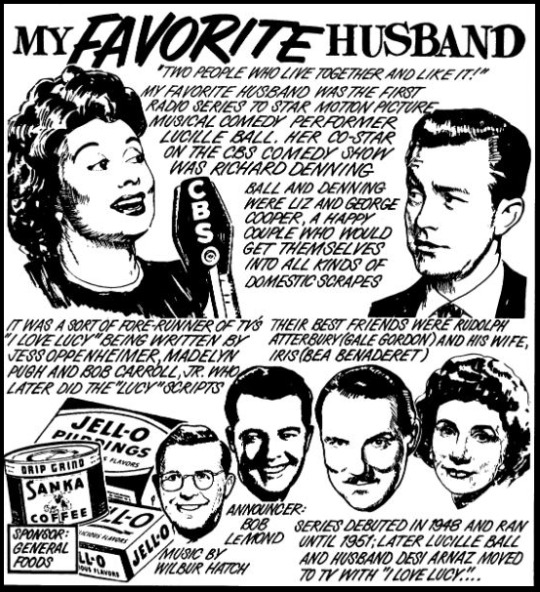
Lucille Ball (Liz Cooper) was born on August 6, 1911 in Jamestown, New York. She began her screen career in 1933 and was known in Hollywood as ‘Queen of the B’s’ due to her many appearances in ‘B’ movies. With Richard Denning, she starred in a radio program titled “My Favorite Husband” which eventually led to the creation of “I Love Lucy,” a television situation comedy in which she co-starred with her real-life husband, Latin bandleader Desi Arnaz. The program was phenomenally successful, allowing the couple to purchase what was once RKO Studios, re-naming it Desilu. When the show ended in 1960 (in an hour-long format known as “The Lucy-Desi Comedy Hour”) so did Lucy and Desi’s marriage. In 1962, hoping to keep Desilu financially solvent, Lucy returned to the sitcom format with “The Lucy Show,” which lasted six seasons. She followed that with a similar sitcom “Here’s Lucy” co-starring with her real-life children, Lucie and Desi Jr., as well as Gale Gordon, who had joined the cast of “The Lucy Show” during season two. Before her death in 1989, Lucy made one more attempt at a sitcom with “Life With Lucy,” also with Gordon.
Richard Denning (George Cooper) was born Louis Albert Heindrich Denninger Jr., in Poughkeepsie, New York. When he was 18 months old, his family moved to Los Angeles. Plans called for him to take over his father's garment manufacturing business, but he developed an interest in acting. Denning enlisted in the US Navy during World War II. He is best known for his roles in various science fiction and horror films of the 1950s. Although he teamed with Lucille Ball on radio in “My Favorite Husband,” the two never acted together on screen. While “I Love Lucy” was on the air, he was seen on another CBS TV series, “Mr. & Mrs. North.” From 1968 to 1980 he played the Governor on “Hawaii 5-0″, his final role. He died in 1998 at age 84.
Bea Benadaret (Iris Atterbury) was considered the front-runner to be cast as Ethel Mertz but when “I Love Lucy” was ready to start production she was already playing a similar role on TV’s “The George Burns and Gracie Allen Show” so Vivian Vance was cast instead. On “I Love Lucy” she was cast as Lucy Ricarodo’s spinster neighbor, Miss Lewis, in “Lucy Plays Cupid” (ILL S1;E15) in early 1952. Later, she was a success in her own show, “Petticoat Junction” as Shady Rest Hotel proprietress Kate Bradley. She starred in the series until her death in 1968.
Ruth Perrott (Katie, the Maid) was also later seen on “I Love Lucy.” She first played Mrs. Pomerantz, a member of the surprise investigating committee for the Society Matrons League in “Pioneer Women” (ILL S1;E25), as one of the member of the Wednesday Afternoon Fine Arts League in “Lucy and Ethel Buy the Same Dress” (ILL S3;E3), and also played a nurse when “Lucy Goes to the Hospital” (ILL S2;E16). She died in 1996 at the age of 96.
Bob LeMond (Announcer) also served as the announcer for the pilot episode of “I Love Lucy”. When the long-lost pilot was finally discovered in 1990, a few moments of the opening narration were damaged and lost, so LeMond – fifty years later – recreated the narration for the CBS special and subsequent DVD release.
Gale Gordon (Rudolph Atterbury) does not appear in this episode.
GUEST CAST

Hans Conried (Mr. Benjamin Wood) first co-starred with Lucille Ball in The Big Street (1942). He then appeared on “I Love Lucy” as used furniture man Dan Jenkins in “Redecorating” (ILL S2;E8) and later that same season as Percy Livermore in “Lucy Hires an English Tutor” (ILL S2;E13) – both in 1952. The following year he began an association with Disney by voicing Captain Hook in Peter Pan. On “The Lucy Show” he played Professor Gitterman in “Lucy’s Barbershop Quartet” (TLS S1;E19) and in “Lucy Plays Cleopatra” (TLS S2;E1). He was probably best known as Uncle Tonoose on “Make Room for Daddy” starring Danny Thomas, which was filmed on the Desilu lot. He joined Thomas on a season 6 episode of “Here’s Lucy” in 1973. He died in 1982 at age 64.
Conried played Mr. Wood on several episodes. Wood is a neighbor of the Coopers with eleven children!

Frank Nelson (Derelict) was born on May 6, 1911 (three months before Lucille Ball) in Colorado Springs, Colorado. He started working as a radio announcer at the age of 15. He later appeared on such popular radio shows as “The Great Gildersleeve,” “Burns and Allen,” and “Fibber McGee & Molly”. Aside from Lucille Ball, Nelson is perhaps most associated with Jack Benny and was a fifteen-year regular on his radio and television programs. His trademark was playing clerks and other working stiffs, suddenly turning to Benny with a drawn out “Yeeeeeeeeees?” Nelson appeared in 11 episodes of “I Love Lucy”, including three as quiz master Freddy Fillmore, and two as Ralph Ramsey, plus appearance on “The Lucy-Desi Comedy Hour” - making him the only actor to play two different recurring roles on “I Love Lucy.” Nelson returned to the role of the frazzled Train Conductor for an episode of “The Lucy Show” in 1963. This marks his final appearance on a Lucille Ball sitcom.

Elvia Allman (Marge Van Tassel) was born on September 19, 1904 in Enochville, North Carolina. She started her performing career on radio in the 1920s, as both a storyteller and singer. This led to work voicing cartoon characters for Warner Brothers. Simultaneously, she was pursuing stage acting, appearing at the Pasadena Playhouse. Allman made her film debut as an actress in 1940’s The Road to Singapore as a homely woman who pursues Bob Hope. Allman played the strident forewoman of Kramer’s Kandy Kitchen in “Job Switching” (ILL S2;E1). She would return to the show as one of Minnie Finch’s neighbors in “Fan Magazine” (ILL S3;E17) and as reporter Nancy Graham in “The Homecoming” (ILL S5;E6). She made two appearances each on The Lucy–Desi Comedy Hour“ and ”The Lucy Show.“
On “I Love Lucy,” Lucy Ricardo frequently was heard talking to a club woman named Marge on the telephone, but her last name was never mentioned. When we finally get to meet Marge she is played by Charlotte Lawrence.
Naomi Brubaker and other Women’s Club Members are played by uncredited performers.
EPISODE

The episode opens late evening at the Cooper’s where Liz is typing and George is reading a book. Liz complains about Mr. Woods’ kids ringing the doorbell - but it is just the bell on the typewriter. Liz is typing her acceptance speech for tomorrow’s women’s club election. She reads the speech aloud for George:
LIZ: “Ladies of the Sheridan Falls Women’s Club: First, I want to thank everyone who voted for me. You will not be disappointed. I’ll do my best to be a good _______ this year.”

On "I Love Lucy” the Sheridan Falls Women’s Club was known as The Wednesday Afternoon Fine Arts League.
Liz will fill in the blanks once she is elected. She is sure to be elected to some office, as everyone in the club is an officer - all 25! The only office Liz is not expected to be elected to is Treasurer, which always goes to Naomi Brubaker, whose husband is a CPA.
Next day at the Club meeting, Iris (as President) makes announcements and reads the election results. As Iris owns the clubhouse furniture, she is naturally re-elected President. Vice President goes to Phyllis Brown, though Liz assumes it will be her. Secretary goes to Marge Van Tassell (Elvia Allman), although Liz expects it to be her. Instead, Liz has been elected 25th Honorary Exalted Alternate. The bad news is that although Naomi is re-elected treasurer, she must resign as her husband the CPA has been transferred to California. Because Liz’s husband George is a banker, Liz’s nomination and election is rushed through, much to her dismay.
IRIS: “Liz, you’ve been elected! This is a democracy! It’s the will of the people!” LIZ: “It is not! I’m a people and I didn’t even get a chance to peep!”

Liz’s rush to read her acceptance speech before her name is even announced is very similar to Lucy Ricardo’s rising to acknowledge her nomination before her name is read aloud in “The Club Election”. Liz and Lucy’s hopes are dashed each time Madam President announces a new result.
George is concerned about Liz’s election to treasurer because of her inability to do her household accounts. He lays down the law: if her household accounts don’t balance, then she must resign! Liz confides in Katie the Maid that the Club’s books are a real disaster.

On “I Love Lucy,” Lucy Ricardo’s household accounts became so messy that Ricky hired “The Business Manager” (ILL S4;E1) to try to make sense of them. Charles Lane played Mr. Hickox.
Liz asks neighbor Mr. Wood (Hans Conried) for help with the club’s books. She has plans to build a new clubhouse, but she doesn’t know the difference between income and expenses and can’t add 9 and 9. Mr. Wood says the club only has forty cents in their ledger!
LIZ: “What kind of a clubhouse can you buy for forty cents!?” MR. WOOD: “Maybe you should settle on a club sandwich.”

After a commercial by announcer Bob LeMond for Jello Vanilla Tapioca Pudding, the story resumes. It is the first of the month and George wants to see Liz’s household books, but she is forty dollars short, so she tricks him into thinking he is late for work by setting the clocks forward. Liz gets an idea to transfer the money from the club to the household accounts and back again!
At the meeting, Liz reports a surplus of $100. Marge wants to contribute the money to the Sheridan Falls Boys Club. The donation is voted through although Liz knows this will spoil her scheme to juggle the books.
Back at home, she confesses to Katie that she didn’t give the Boy’s Club the full amount. To clear her guilty conscience she decides to give the rest of the money to the first needy charity she sees. She opens the front door and coincidentally a derelict (Frank Nelson) is passing by. She give him the forty dollars.
When George comes home to see her books, Liz faces the music, fearing the worst. Just then the doorbell rings. It is the Derelict who hands her $740. He took her $40 and bet it on a horse at Belmont who came in 16 to 1! Liz gladly returns to face George!
At one time, early in her career, Lucille Ball went by the name Diane Belmont, naming herself after the New York Racetrack!
In a live Jello commercial, Lucy plays a tourist in sunny France and Bob LeMond a Frenchman flirting with her. He says he reminds her of Jello Tapioca Pudding!
LUCY: “Well, tap my ‘oka’ - these Frenchmen really know how to make love!”
In the usual bedtime tag, Liz wakes George from a sound sleep to report she’s had a dream of being in the desert. He is sure she wants him to get her a glass of water. Instead, he brings a whole pitcher and dumps it on her! End of episode.

Bob LeMond reads a pitch for men to join the military, highlighting educational opportunities. He reminds listeners that Lucille Ball can be seen in the film Miss Grant Takes Richmond. The film had premiered just ten days before this broadcast.
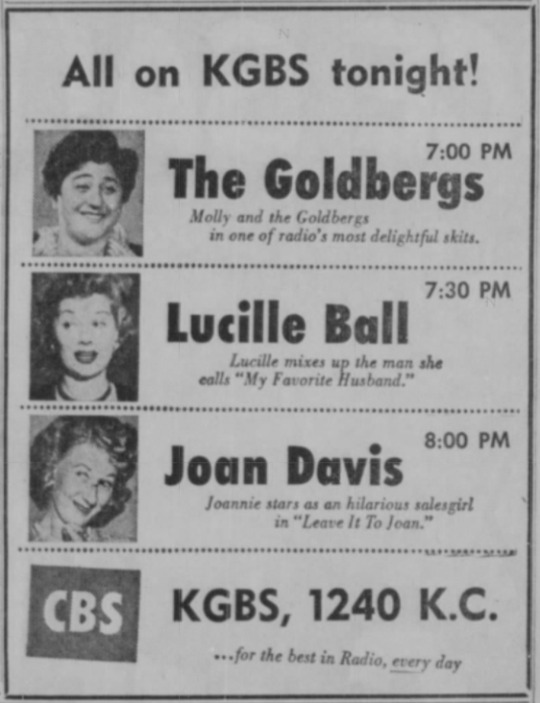
#My Favorite Husband#I Love Lucy#Lucille Ball#Richard Denning#Bea Benadaret#Ruth Perrott#Bob Lemond#Elvia Allman#Frank Nelson#Hans Conried#Club Election#1949#Radio#CBS#Jello#Miss Grant Takes Richmond
0 notes
Text
LUCY’S BIRTHDAY
S1;E8 ~ November 18, 1968


Directed by Jack Donohue ~ Written by Milt Josefsberg and Ray Singer
Synopsis
Kim and Craig take Lucy out to a Chinese restaurant to celebrate her birthday. But when Craig forgets his wallet, Lucy must fake illness to get out of paying the bill.
Regular Cast
Lucille Ball (Lucy Carter), Gale Gordon (Harrison Otis Carter), Lucie Arnaz (Kim Carter), Desi Arnaz Jr. (Craig Carter)
Guest Cast

Victor Sen Yung (Waiter) is probably best remembered as ranch cook Hop-Sing on “Bonanza” from 1959 to 1973. This is the first of his two appearances on “Here’s Lucy.” He appeared in two dozen films and TV shows with uncredited extra Spencer Chan. He died in 1980 at age 65 of natural gas poisoning in his own home a month after his final film was released.
Spencer Chan (Restaurant Employee, uncredited) was a Los Angeles-born actor with more than 100 TV and film projects on his resume, most all uncredited, many with Victor Sen Yung. This is his only appearance with Lucille Ball.
Murray Pollack (Restaurant Patron, uncredited) was seen as one of the party guest in “Country Club Dance” (ILL S6;E25), the episode that introduced Barbara Eden. Coincidentally, he later appeared on half a dozen episodes of “I Dream of Jeannie.” He was at the airport when “The Ricardos Go to Japan” (1959). He was seen in the 1963 movie Critic’s Choice with Lucille Ball. He made two appearances on “The Lucy Show.” This is the first of his three episodes of “Here’s Lucy.”

Joan Carey (Restaurant Patron far right above, uncredited) was a background performer on “I Love Lucy,” and “The Lucy Show,” where she also served as Lucille Ball’s camera and lighting stand-in.
Other restaurant patrons and staff are played by uncredited background performers.

At the time this episode first aired, Lucille Ball was 57 years old. Ball’s birthday is August 6th.
Victor Sen Yung, Spencer Chan, and Murray Pollack all appeared in the 1961 film musical Flower Drum Song, based on the 1958 Broadway musical by Rodgers and Hammerstein.
This is the first time we have seen Lucy’s bedroom or any of the rooms on the second floor of the house.
The Chinese restaurant is called Yang Sing Ching. The (unseen) proprietor is named Irving. They have matzoh ball soup on the menu. This culture clash will also be a source of humor in “Lucy and the Generation Gap” (1969) where Victor Sen Yung, who is also in this episode, plays a Chinese Irishman running a Pizzeria.

Kim sings “Happy Birthday” to her mother. The song is also used in the underscoring. In the final moments, it is sung in Chinese by the waiters and Harry. “Happy Birthday To You” has traditionally been attributed to sisters Patty and Mildred J. Hill in 1893 and was under copyright. In 2015 a court decision ruled the song was no longer covered under copyright protection.

When trying to think of a possible date for Lucy, Craig asks Kim who she would like to date. Kim replies “I don’t think mother would be happy with Ringo Starr.” Craig then suggests Lawrence Welk. Ringo Starr (born Richard Starkey in 1940) was the singer, songwriter, and drummer for the phenomenally successful Beatles. Lawrence Welk (1903-1992) was a musician, accordionist, bandleader, and television impresario, who hosted TV’s The Lawrence Welk Show from 1951 to 1982. Welk was mentioned several times on “The Lucy Show” and starred as himself on a 1970 episode of “Here’s Lucy.” These two musical artists also represent the spectrum of popular music – from rock and roll (Kim’s generation) to big band (Lucy’s generation).
Harry says that he promised to give Lucy a raise on her 40th birthday. In an earlier episode Lucy says that she’s only worked for Harry for two years. Lucy is about to try to calculate her back pay but realizes that would mean disclosing her real age, so…she takes an early lunch instead!

Alone in the office, Harry is nearly caught by his niece and nephew looking at a magazine centerfold. Although the cover of the magazine has been removed, the fold-out centerfold was a device used by Playboy Magazine, a publication that was famous for its photographs of nude or nearly nude women.
Harry says he wishes his niece and nephew had been named after his grandparents: Bonnie and Clyde. This is the second series reference to the Oscar-winning biopic Bonnie and Clyde.

The waiter calls Harry “Hot Shot Harry.” Apparently, he has a reputation around Yang Sing Ching.
Lucy plans to fake illness because she has no money to pay the bill. She brags her performance will make “the dying scene of ‘Camille’ look like a love-in.” Camille was a 1936 film starring Greta Garbo based on the 1848 novel La Dame aux Camélias (The Lady with the Camellias) by Alexandre Dumas fils, in which a young courtesan is dying of consumption. Camille is mentioned several times on “I Love Lucy” and “The Lucy Show.” During the 1960s a 'love-in’ was is a peaceful public gathering focused on meditation, love, music, sex and sometimes the use of psychedelic drugs. The term was coined by Los Angeles radio comedian Peter Bergman, who may also have hosted the first one in early 1967.

Although this episode has a happy, sentimental ending, it is considered politically incorrect today to depict stereotypical Asians speaking English by changing the letter ‘L’ to ‘R’ (’Rucy’ instead of ‘Lucy’). Clever dialogue is displayed in the scene depicting the selection of the menu items and Lucille Ball gets to show of her skill at physical comedy through the use of chopsticks.


A lonely Lucy Ricardo sought the company of the Friends of the Friendless in “Lucy’s Last Birthday” (ILL S2;E25).

When they have no money to pay the check, Kim and Craig worry that they may have to wash dishes! In “Equal Rights” (ILL S3;E4) the boys teach Lucy and Ethel a lesson by not paying for their dinner, forcing them to work-off their bill by washing dishes.

Lucy also had trouble with chopsticks in a 1962 “Danny Kaye Special” that looked at the international dining craze.

Props! It’s pretty obvious there’s no water in the sink when Kim is washing the breakfast dishes at home.

“Lucy’s Birthday” rates 3 Paper Hearts out of 5
This episode manages to have some charm while walking the fine line of stereotypes of Asian characters. There were worse and things get better.
#Here's Lucy#Lucy's Birthday#Lucille Ball#Gale Gordon#Desi Arnaz Jr.#Lucie Arnaz#Victor Sen Yung#Spencer Chan#Murray Pollack#Chines Restaurant#Chopsticks#Birthday Cake#Happy Birthday To You#Ringo Starr#Lawrence Welk#Flower Drum Song#Camille#Love-In#Playboy Magazine#Centerfold#1968#TV#CBS#Jack Donohue#Milt Josefsberg#Ray Singer#Bonanza#Joan Carey
7 notes
·
View notes